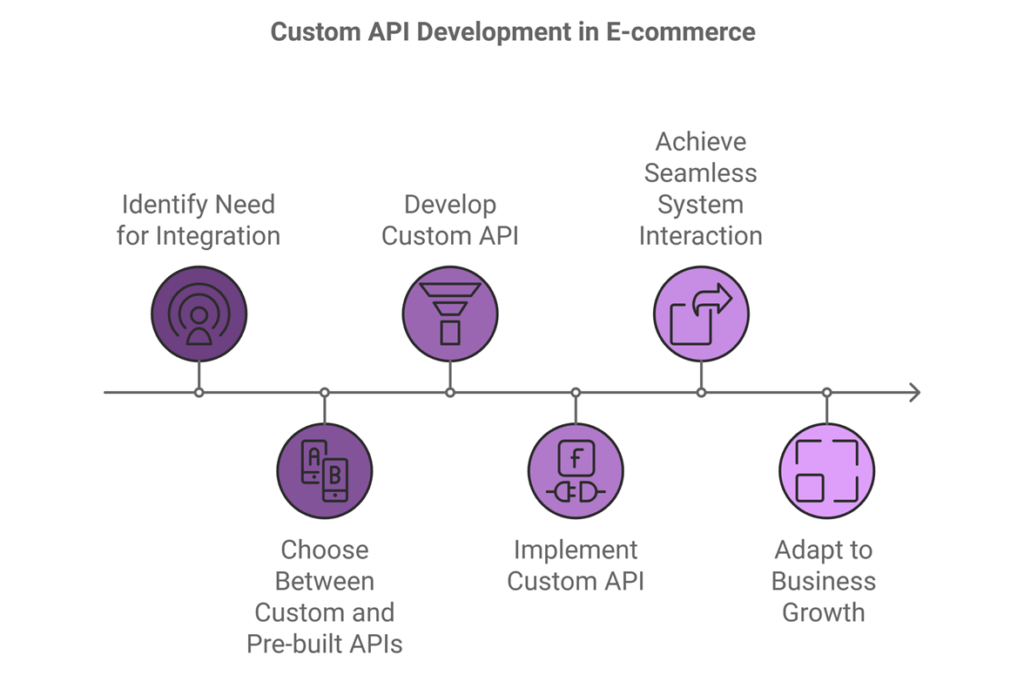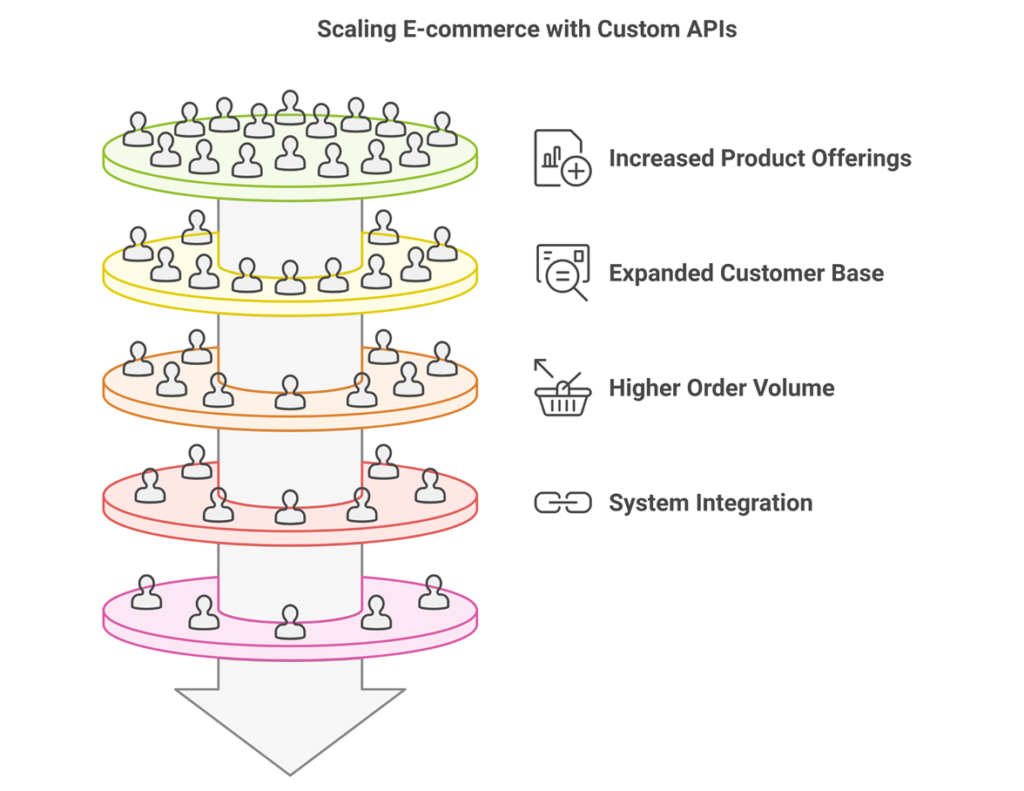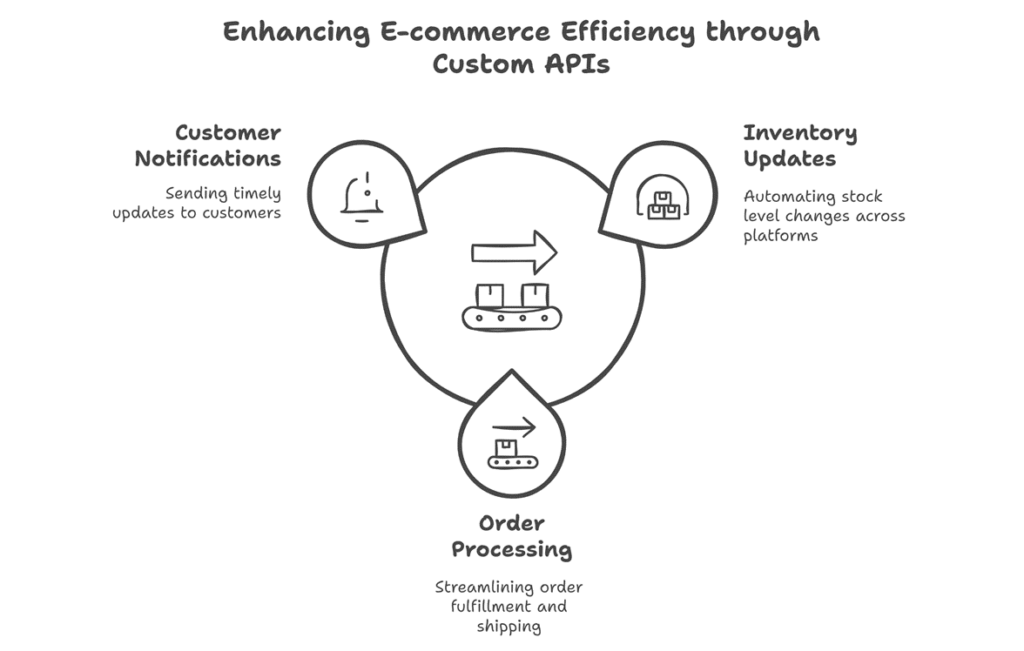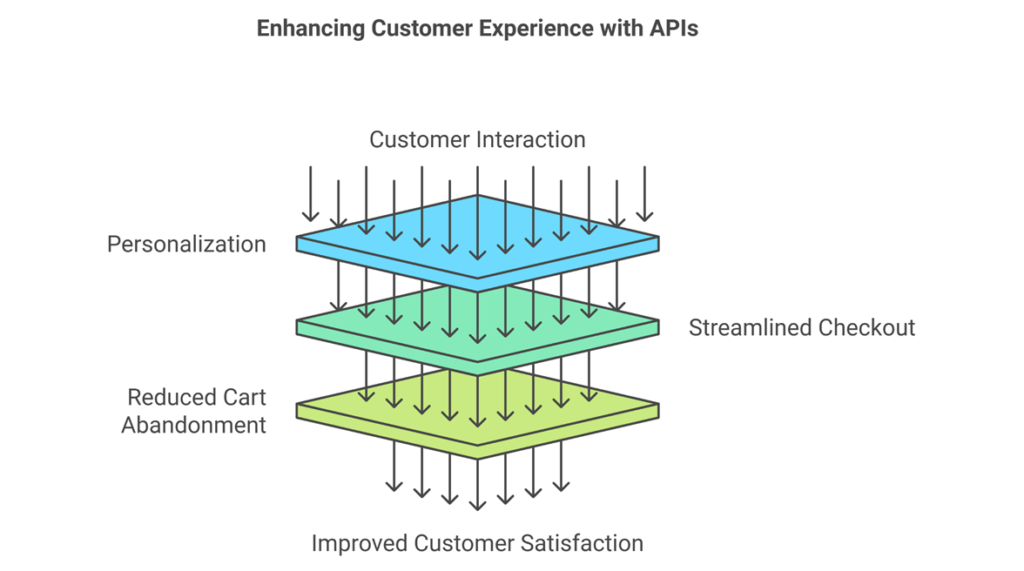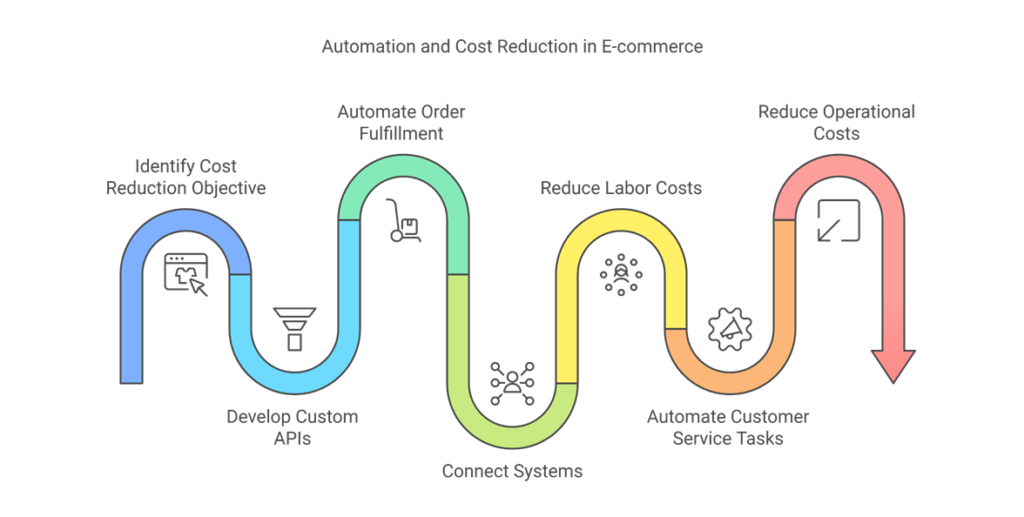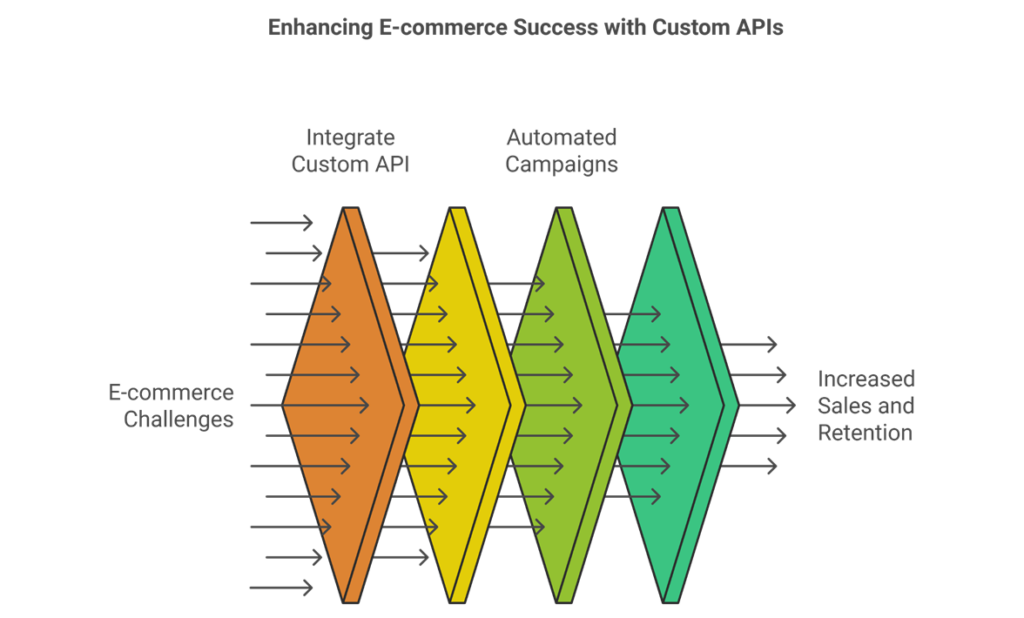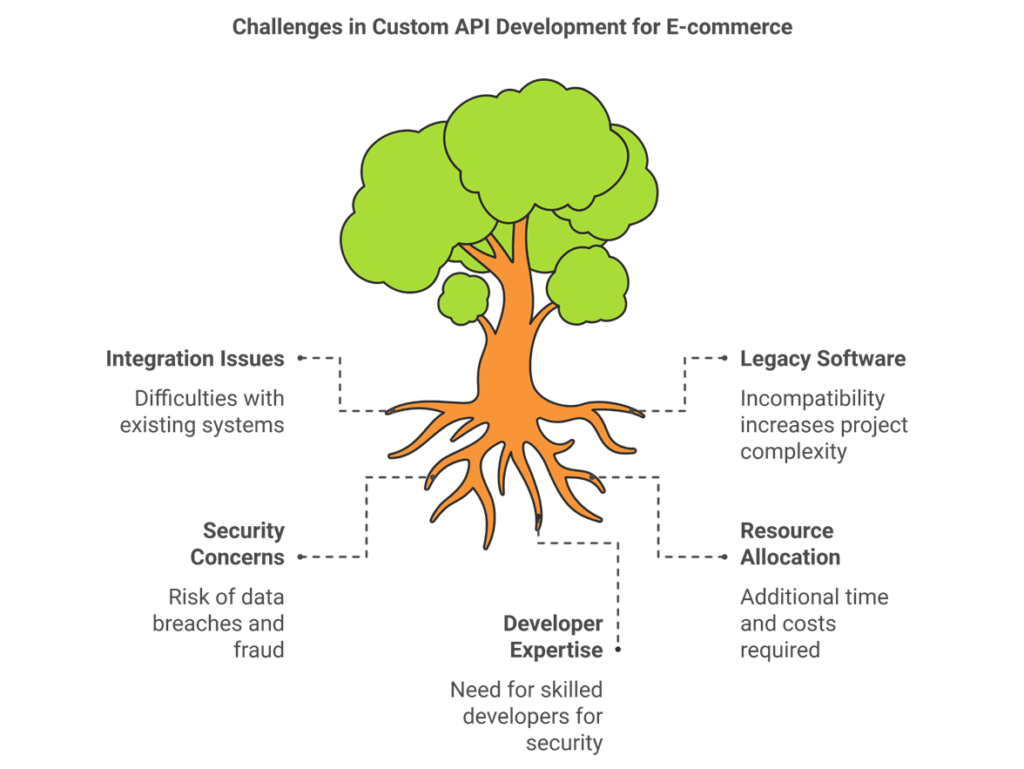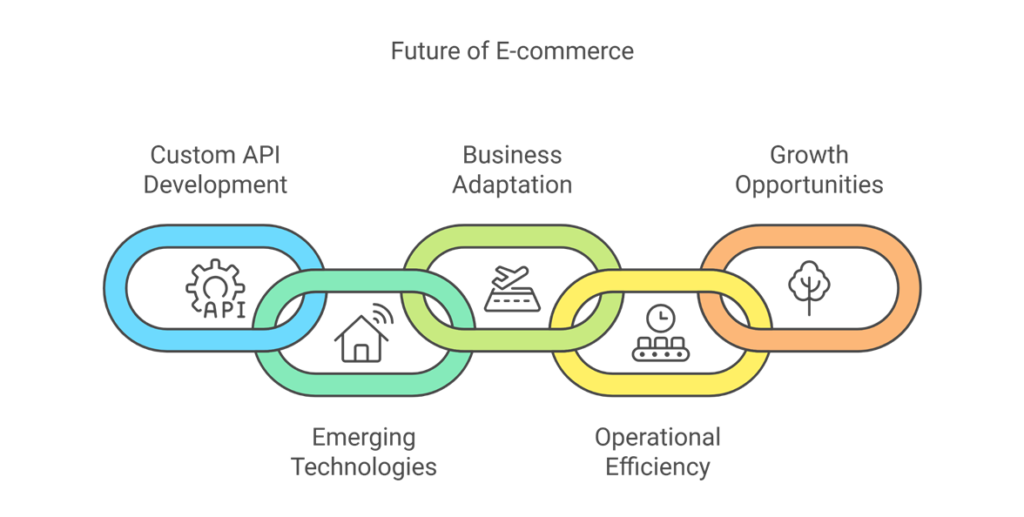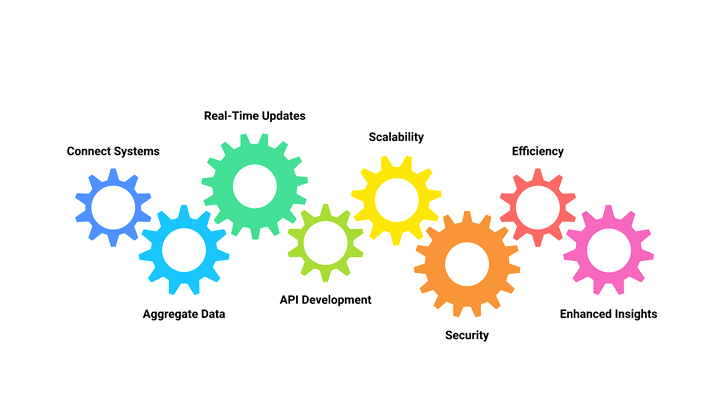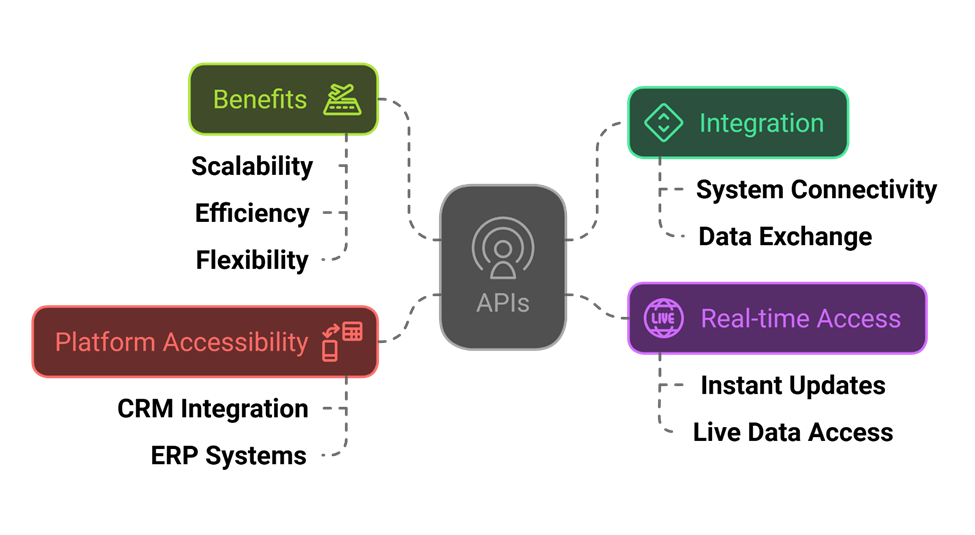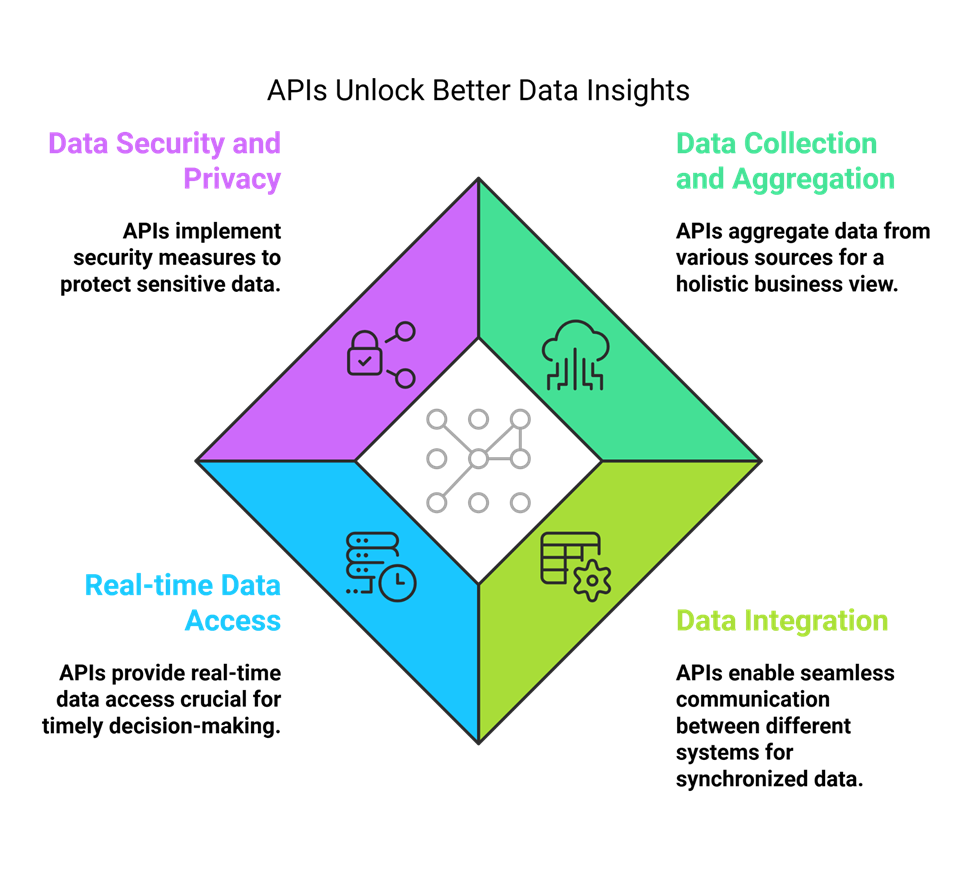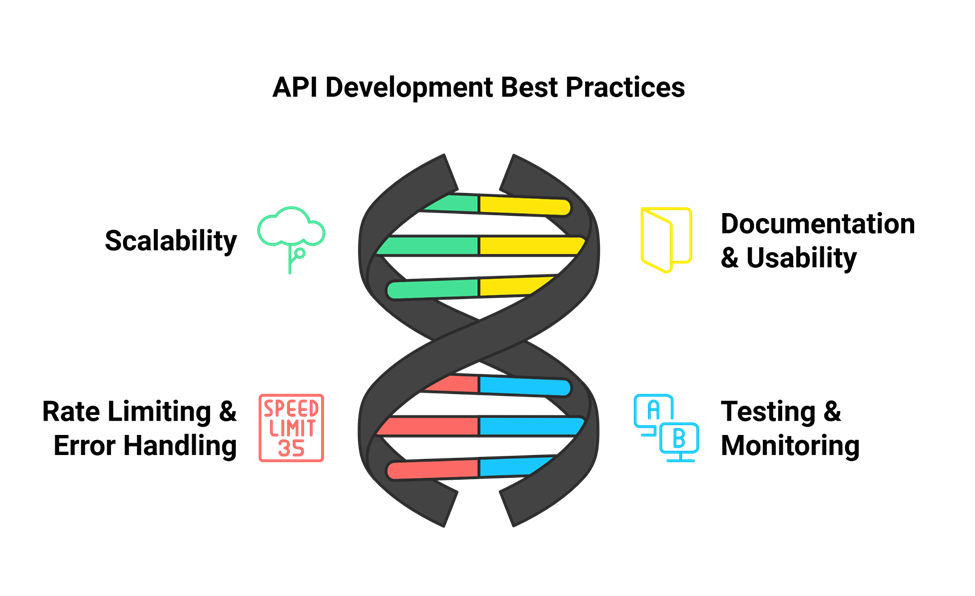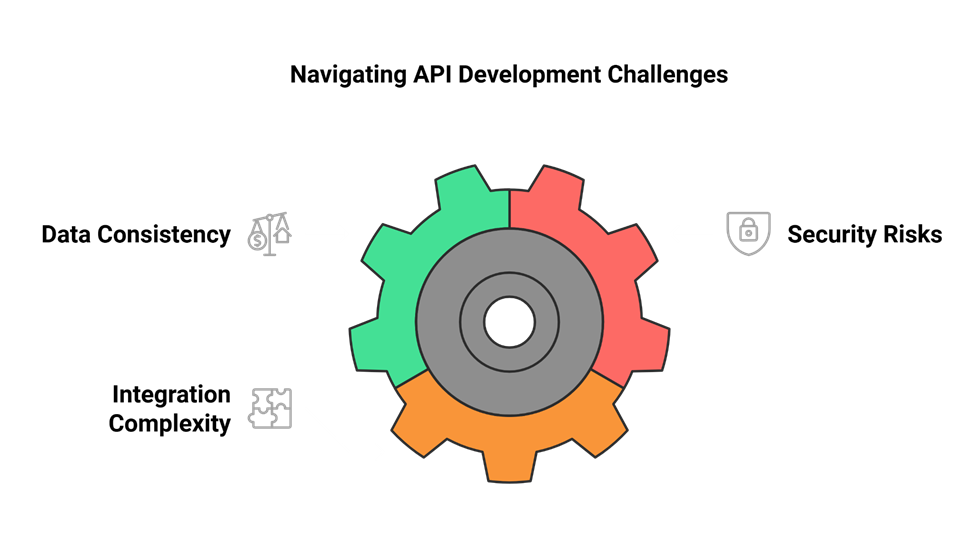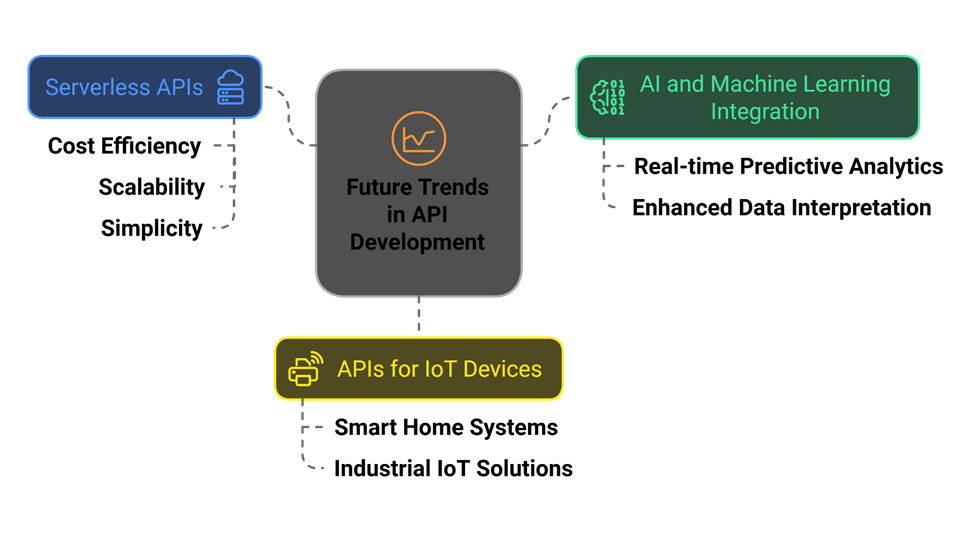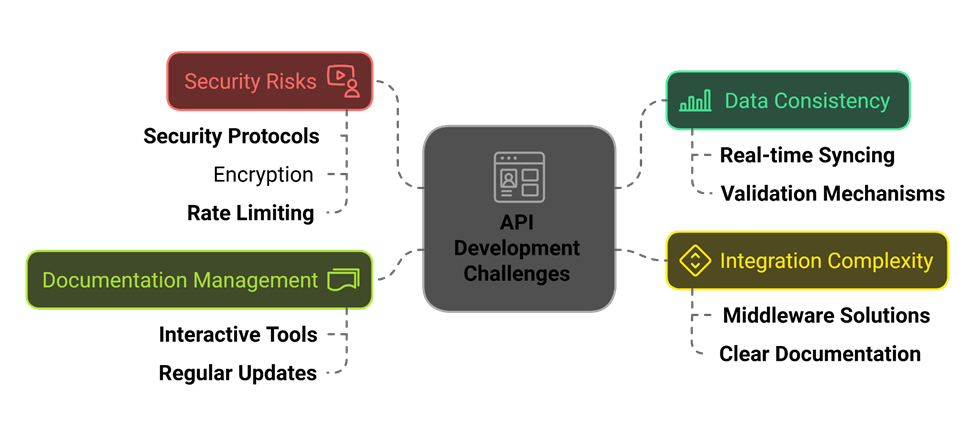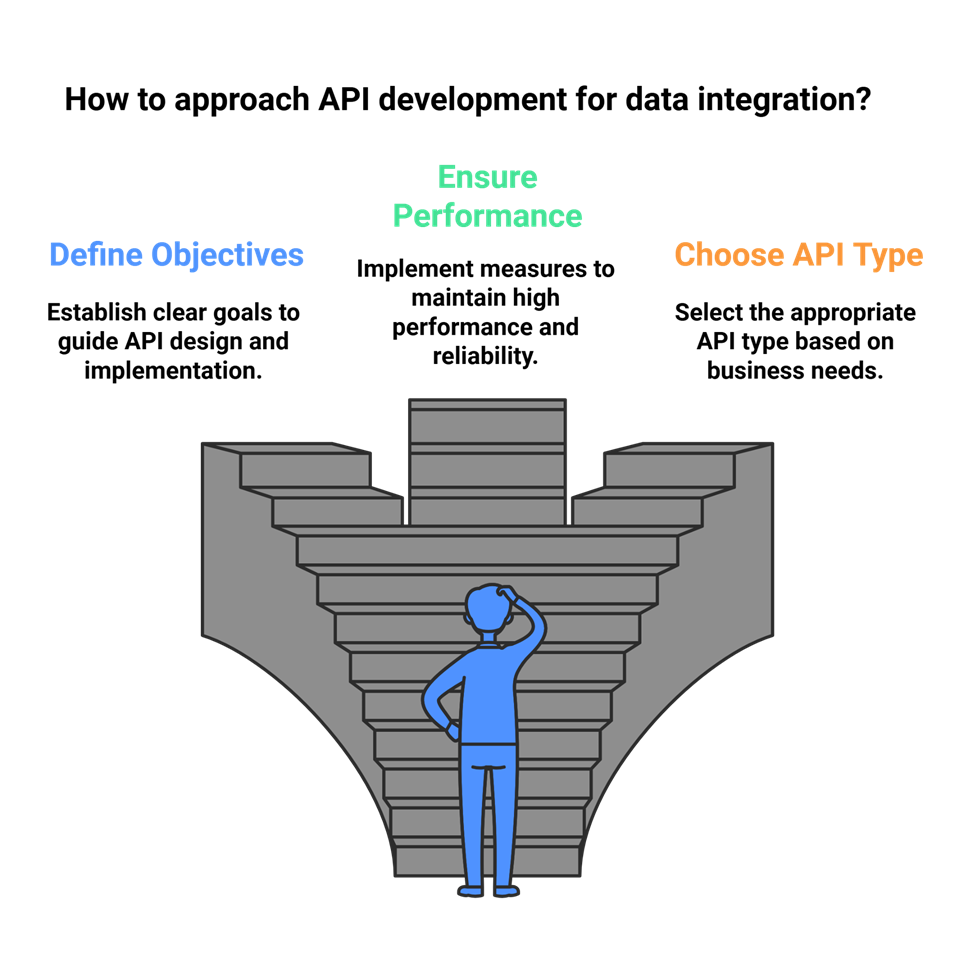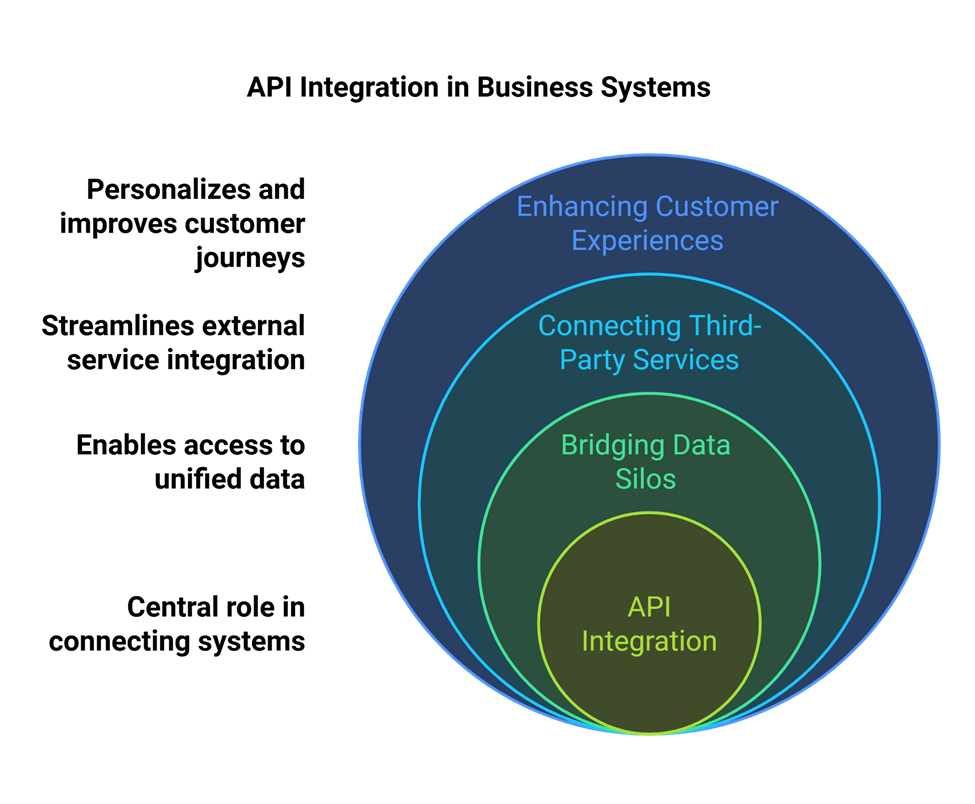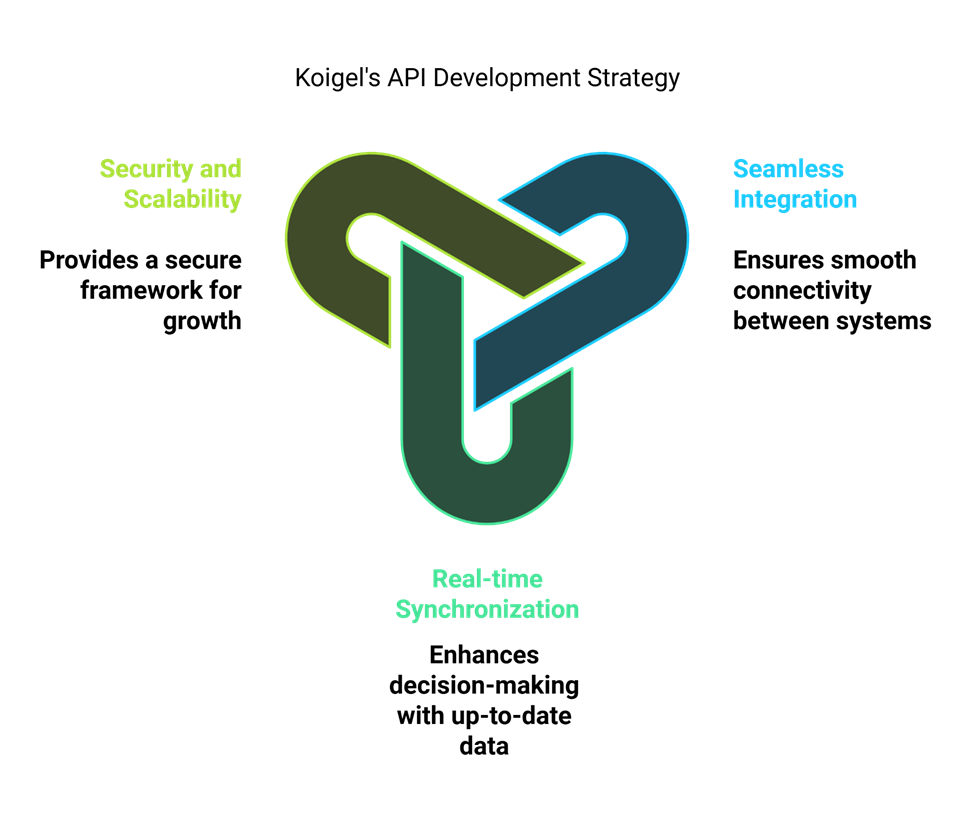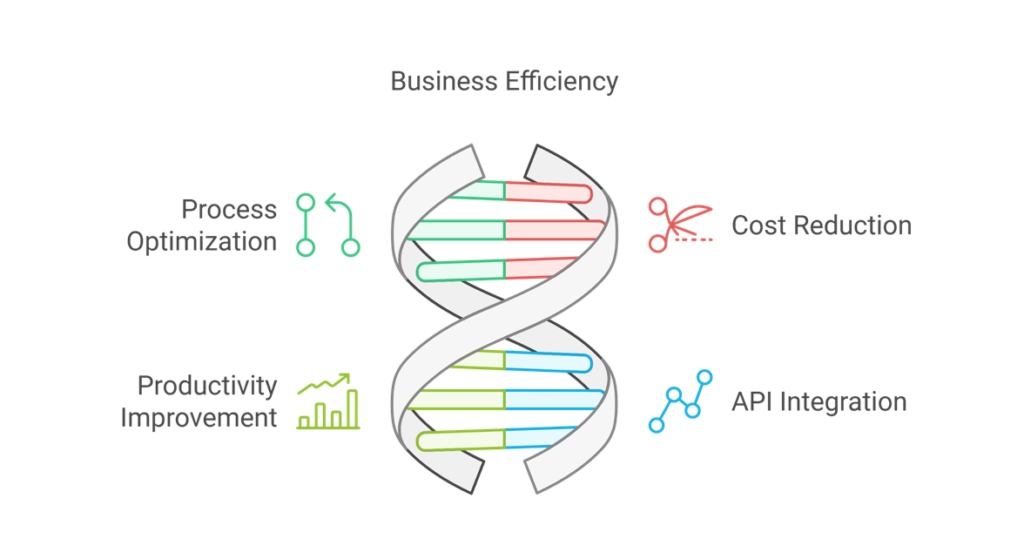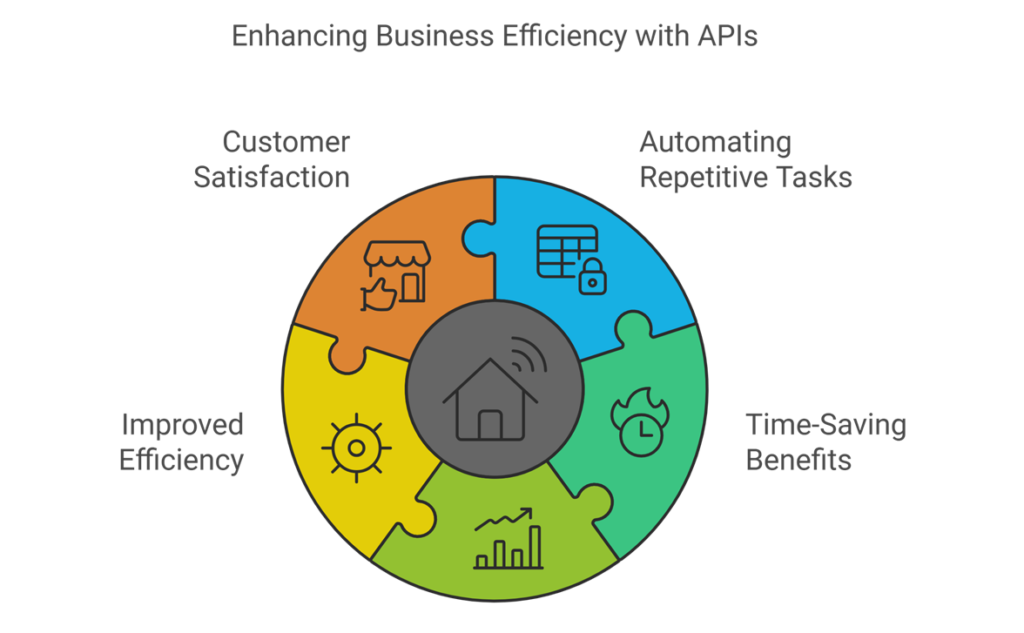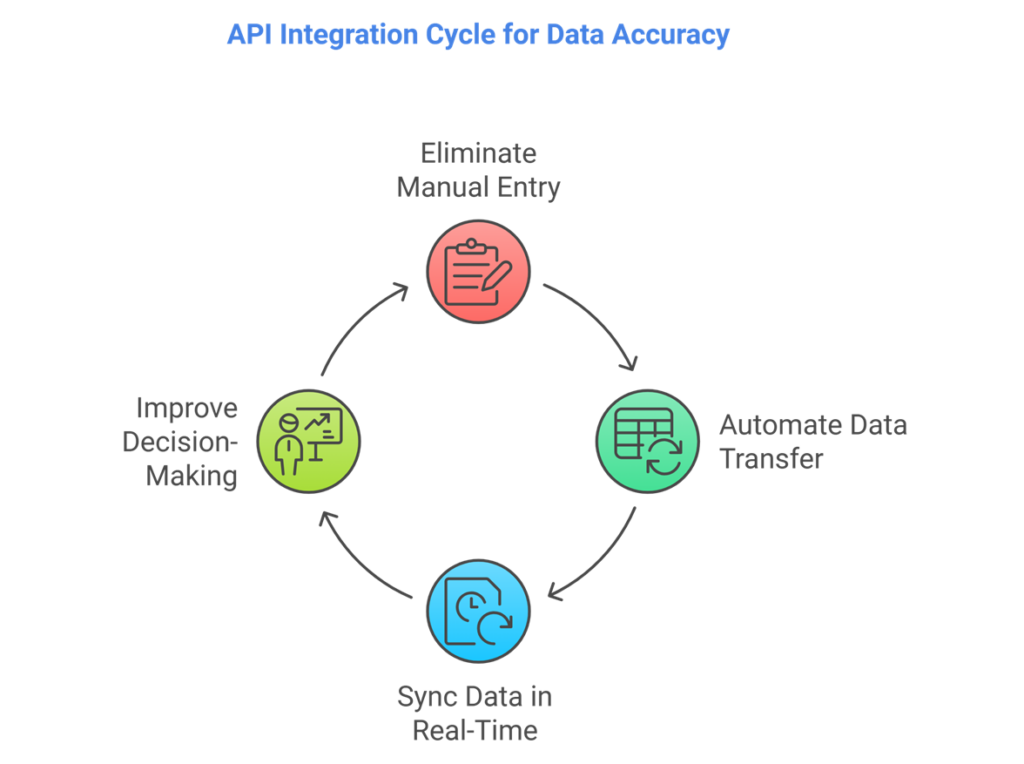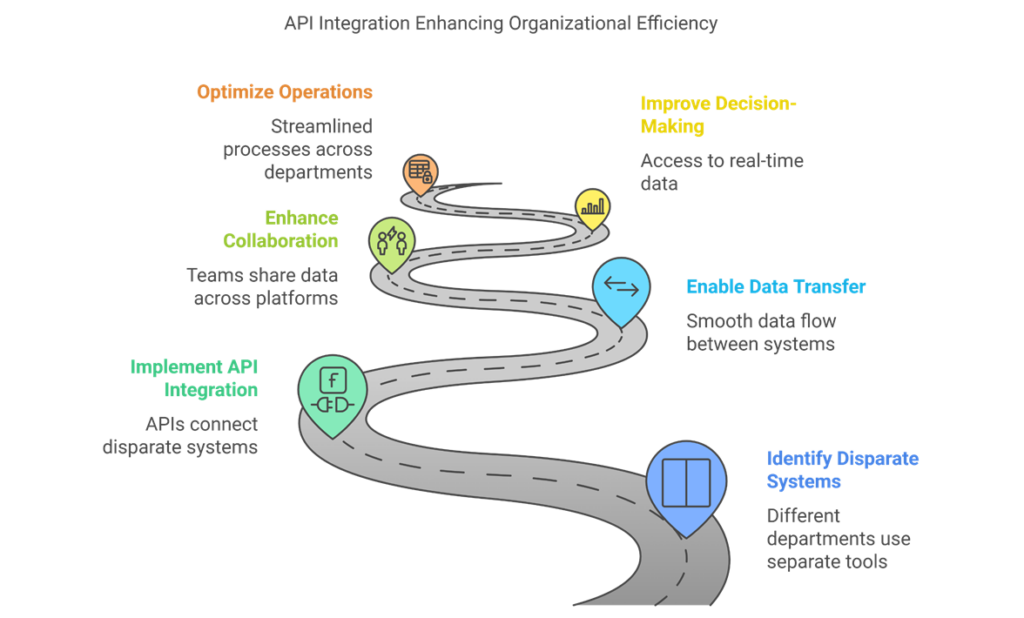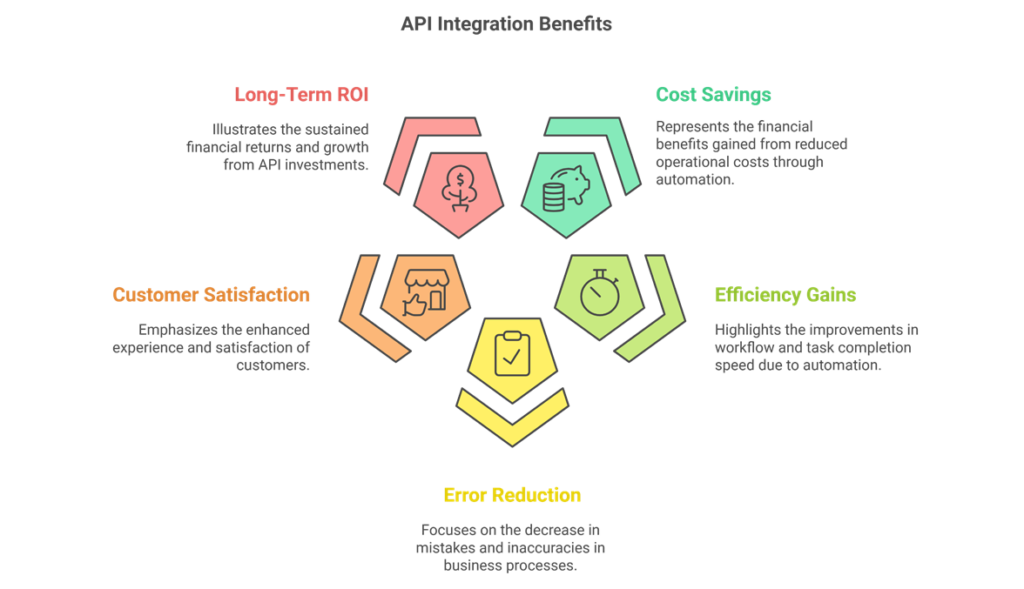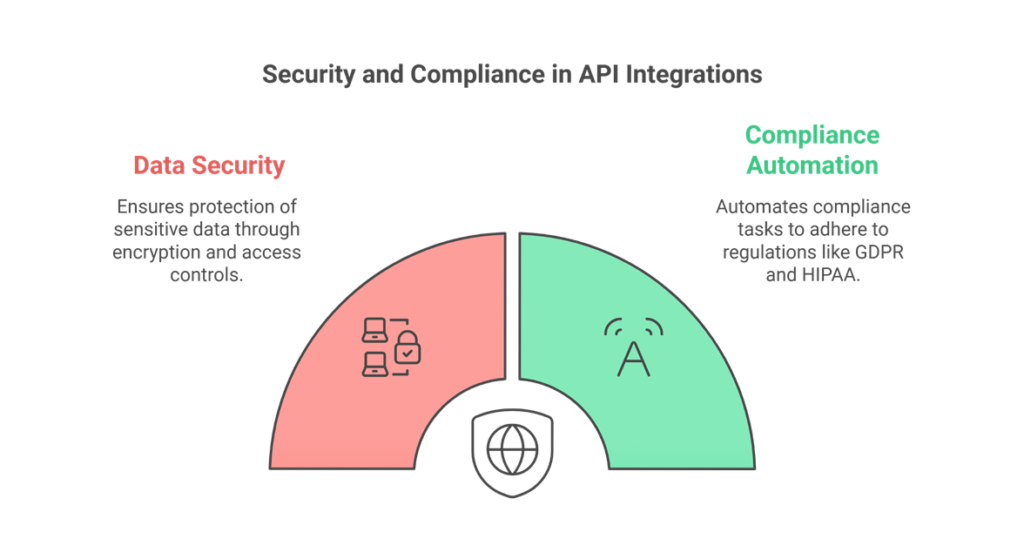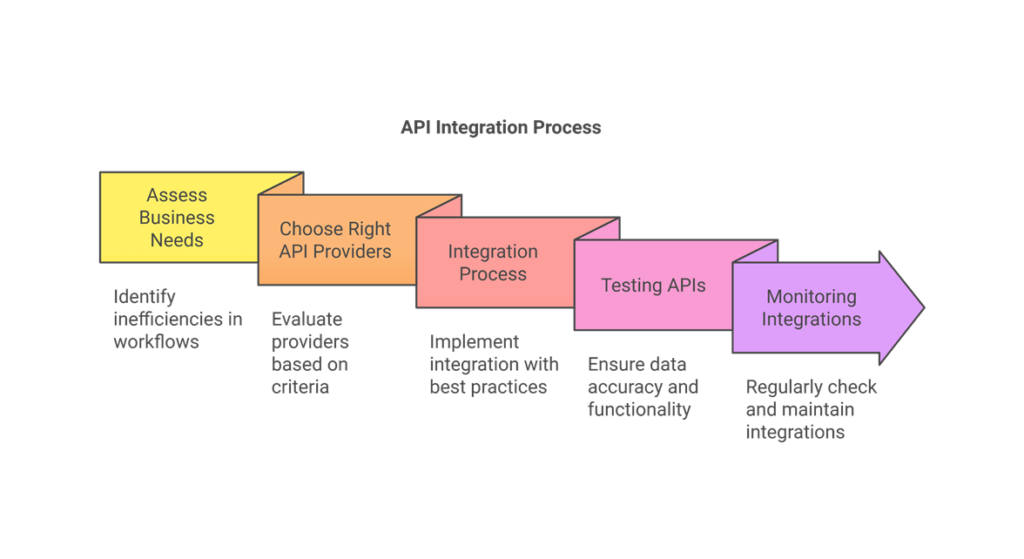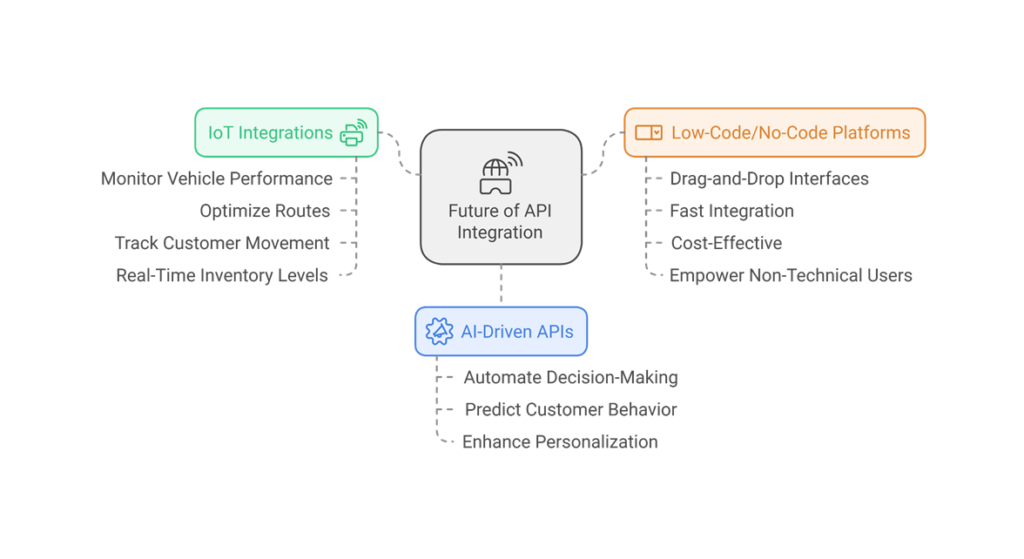In today’s fast-paced digital landscape, e-commerce businesses rely on robust API development and integration to streamline operations, enhance customer experiences, and ensure seamless communication between platforms. This guide delves into the essential tools, technologies, and best practices for creating secure, scalable APIs that drive business efficiency and protect sensitive data. Whether you’re integrating third-party services, building custom APIs, or optimizing performance, this guide provides actionable insights to help you achieve success in the competitive e-commerce space.
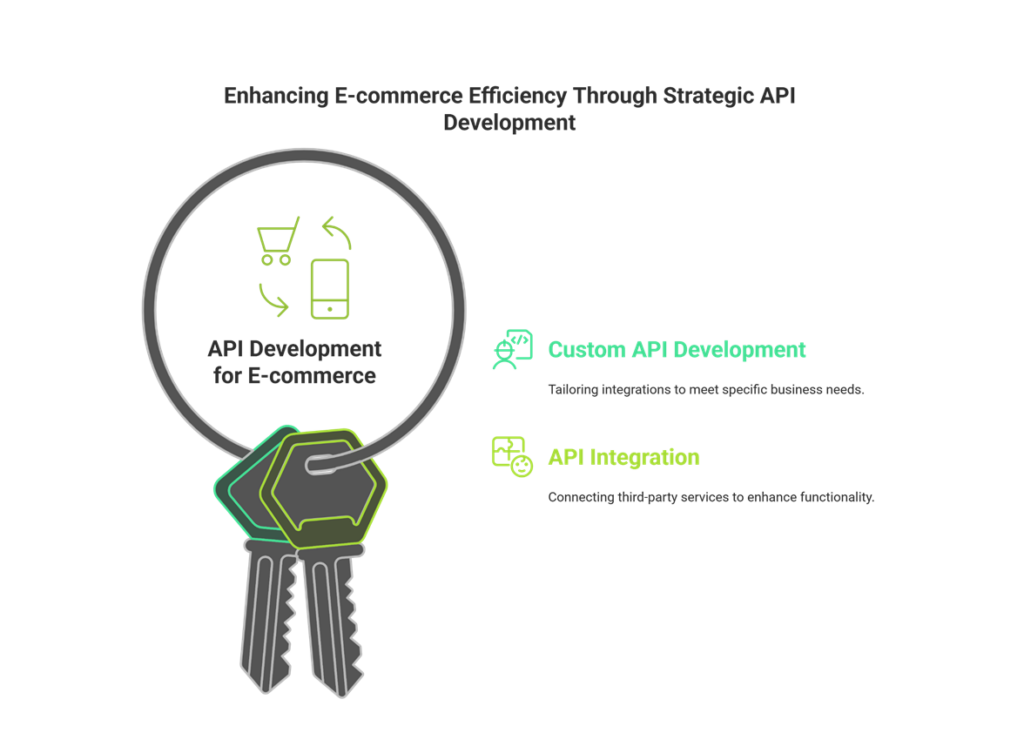
What Is API Development?
API development refers to the process of creating an Application Programming Interface (API) that enables different software systems to communicate with one another. For e-commerce, this means that various platforms and applications—such as shopping carts, payment gateways, inventory systems, and more—can work together seamlessly to create a more efficient and scalable online store.
API Development for E-commerce is crucial because it allows businesses to integrate multiple tools and services, improving operations and enhancing the customer experience. Whether it’s through custom e-commerce API development to tailor integrations or API integration for online stores to connect third-party services, this technology is the backbone that supports modern e-commerce operations.
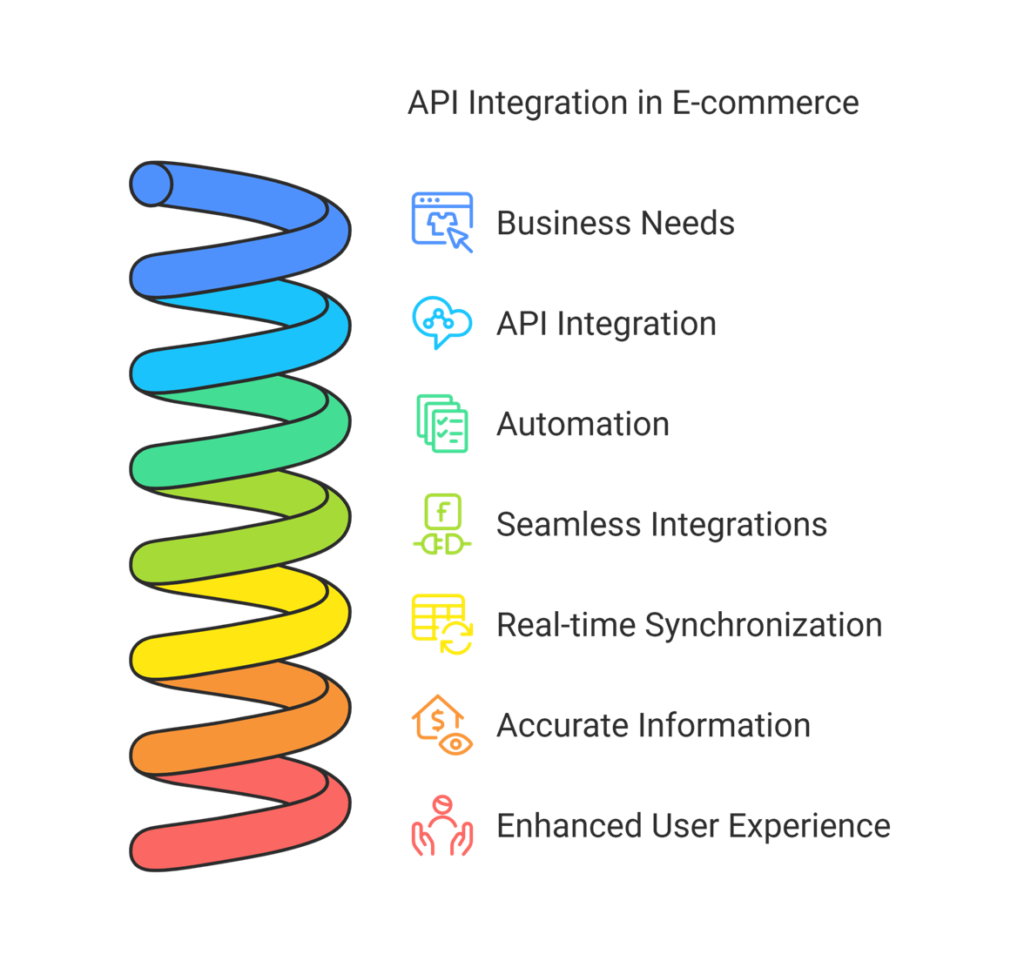
Why APIs Are Vital for E-commerce Businesses
In the rapidly evolving world of e-commerce, businesses face the constant challenge of adapting to changing customer demands, improving operational efficiency, and staying competitive. This is where APIs become indispensable. By allowing different software systems to communicate with each other, APIs offer e-commerce businesses the flexibility, scalability, and performance necessary to succeed in the digital landscape.
E-commerce automation is one of the primary benefits that APIs provide. By automating manual tasks, such as inventory management, order processing, and customer communication, APIs help businesses streamline operations and reduce human error. This automation allows e-commerce companies to scale quickly without compromising on quality or customer service.
Moreover, seamless integrations for online stores enable businesses to connect a variety of third-party services—such as payment gateways, marketing tools, customer service platforms, and logistics services—into their existing infrastructure. With these integrations, e-commerce businesses can offer a smoother experience for customers and internal teams alike, as everything works in harmony.
Perhaps one of the most critical aspects of API development for e-commerce is real-time data synchronization. APIs ensure that data between various systems—whether it’s product stock levels, customer details, or order statuses—remain up-to-date in real time. This eliminates discrepancies and ensures that customers always receive accurate information, whether they’re checking inventory or tracking a shipment. For online stores, having accurate, real-time data is essential for maintaining trust and providing an exceptional user experience.
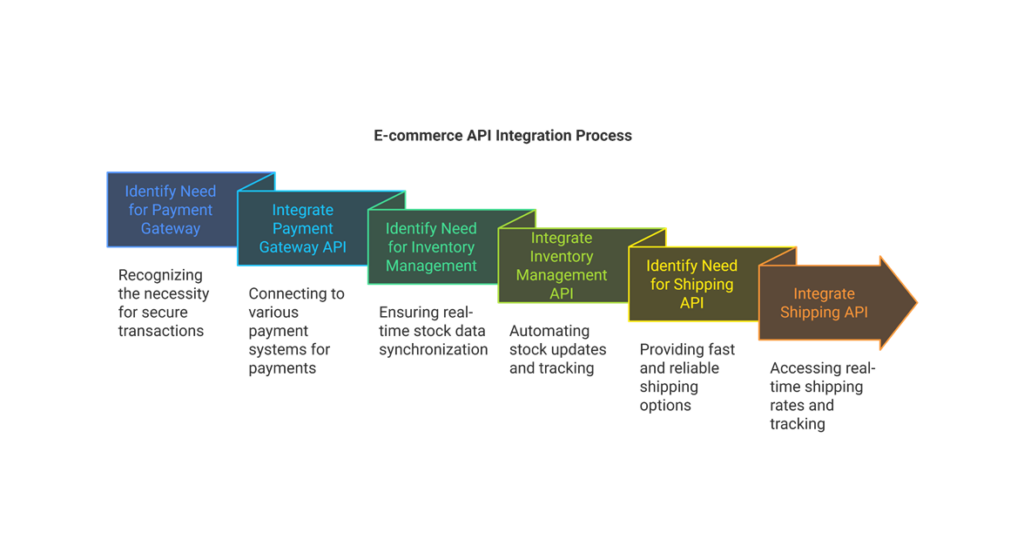
Key Features of E-commerce API Development Services
E-commerce API development services offer a variety of tools and capabilities that can significantly enhance an online store’s operations. These APIs enable businesses to connect and integrate multiple systems, making it easier to manage everything from payment processing to shipping logistics. Below are some of the key features that make e-commerce API development essential for any online business.
Payment Gateway APIs
One of the most crucial features of e-commerce API development is the payment gateway API. These APIs allow e-commerce websites to securely process payments by connecting to various payment systems, such as credit card providers, digital wallets, and other online payment platforms. A well-developed payment gateway API ensures that transactions are completed quickly and securely, providing customers with a seamless and trustworthy checkout experience. Integration with multiple payment methods also gives businesses the flexibility to cater to a wider audience, making it easier for customers to pay through their preferred options.
Inventory Management APIs
Managing inventory is another area where e-commerce API development shines. Inventory management APIs enable online stores to sync real-time data between their e-commerce platform and their inventory systems. This synchronization ensures that stock levels are always up-to-date, reducing the risk of overselling or stockouts. With an efficient inventory management API, businesses can automate stock updates, track product availability across various sales channels, and even streamline restocking processes. These APIs are essential for maintaining a smooth operation and ensuring that customers have access to accurate product availability information at all times.
Shipping APIs
In e-commerce, offering fast and reliable shipping is crucial for customer satisfaction. Shipping APIs integrate e-commerce platforms with logistics services, enabling businesses to automate the shipping process. These APIs provide access to real-time shipping rates, order tracking, and delivery status updates, which are critical for both businesses and customers. By integrating shipping APIs, e-commerce stores can offer a wide range of shipping options and display accurate shipping costs at checkout. Furthermore, automated shipping APIs help reduce errors and ensure that orders are shipped efficiently, making the entire process from purchase to delivery smoother for customers.
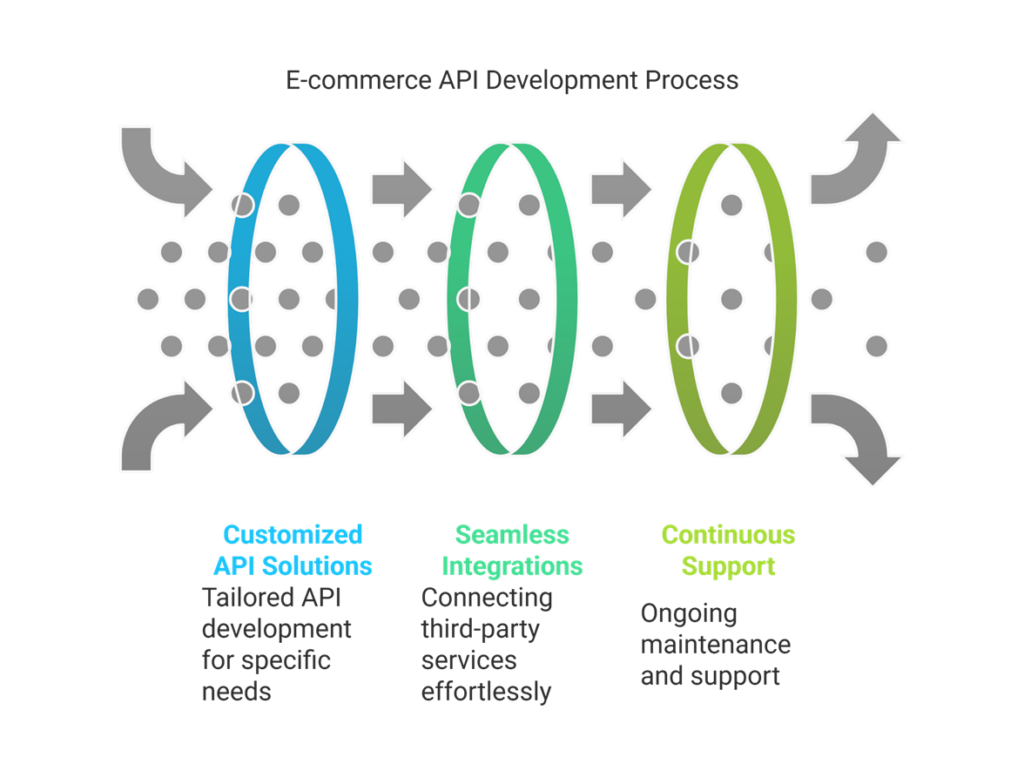
Why Koigel Is the Perfect Partner for Your E-commerce API Development Needs
When it comes to building a robust, scalable, and efficient e-commerce platform, partnering with the right API development service provider is crucial. E-commerce API services are at the heart of enabling seamless integrations and enhancing the functionality of your online store. At Koigel, we understand the unique challenges e-commerce businesses face and provide tailored API development solutions that address these challenges head-on.
Koigel’s commitment to delivering high-quality, customized API development services sets us apart from other providers. With Koigel’s expertise in API development for online stores, we offer solutions that are not only flexible and scalable but also designed to integrate seamlessly with your existing infrastructure. Our team has a deep understanding of the e-commerce landscape and the tools necessary to help your business grow efficiently.
Customized API Solutions for Your Business
At Koigel, we recognize that each e-commerce business is unique, which is why we focus on providing custom e-commerce API solutions. Whether you need to integrate payment gateways, synchronize inventory, or automate order processing, our team works closely with you to build APIs that perfectly align with your business needs. Our solutions are built to enhance operational efficiency, streamline workflows, and improve the overall customer experience.
Expertise in Seamless Integrations
As your trusted partner, we specialize in seamless integrations for online stores. Koigel’s developers are well-versed in connecting various third-party services to your e-commerce platform. From shipping providers and payment gateways to CRM systems and marketing tools, we ensure that all components of your online store function together in harmony. This integration reduces friction, improves performance, and allows your store to scale with ease.
Continuous Support and Maintenance
API development is not a one-time service—it requires ongoing support and maintenance to ensure smooth operation. Koigel offers continuous support after deployment, ensuring that any issues are quickly addressed and that your APIs are always up-to-date with the latest features and security protocols. This ongoing partnership means that you can focus on running your business while we handle the technical aspects.
Why Choose Koigel?
Proven Expertise: Koigel has a proven track record of successful API development for online stores, with a focus on delivering high-quality, reliable, and secure solutions.
Custom Solutions: We understand that your business has specific needs, and we offer custom API services tailored to meet those needs.
Comprehensive Support: From development to integration and ongoing maintenance, we provide end-to-end support to ensure the smooth operation of your e-commerce store.
Koigel is the ideal partner for businesses looking to integrate robust and scalable API solutions into their online store. With our deep expertise in e-commerce API services, we help businesses streamline operations, enhance the customer experience, and achieve long-term success in the competitive world of e-commerce.
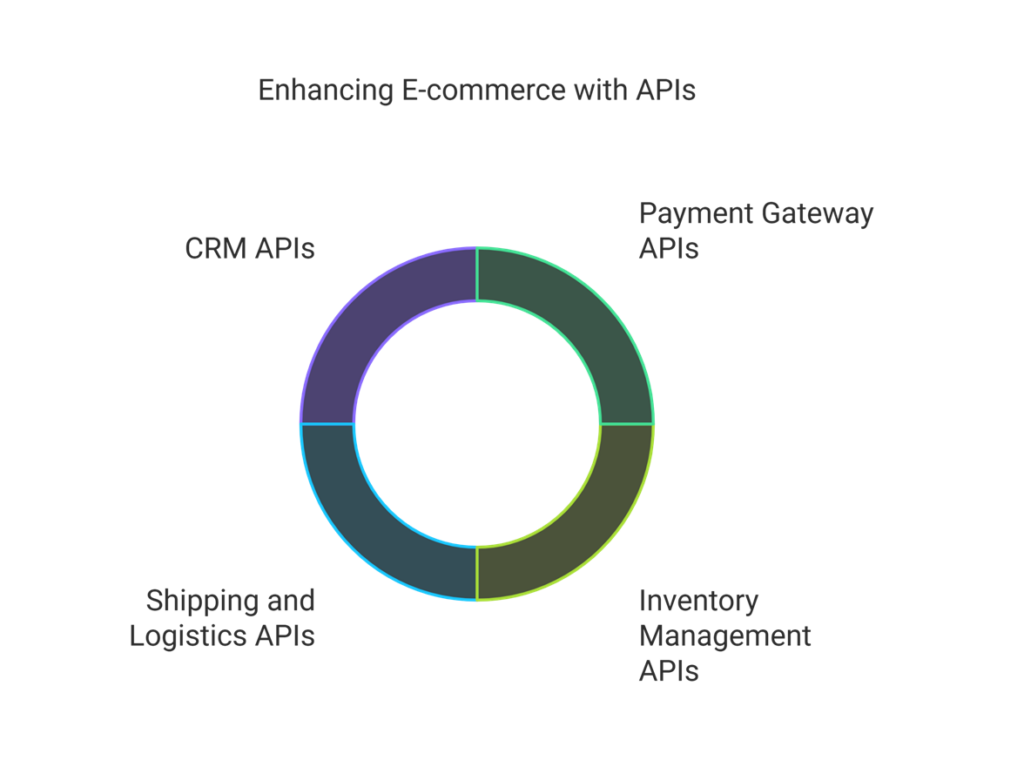
Types of APIs We Offer for E-commerce Businesses
At Koigel, we provide a comprehensive range of API development services that cater specifically to the needs of e-commerce businesses. Our e-commerce API solutions enable seamless integrations and enhance the functionality of your online store. Below are some of the key types of APIs we offer to help streamline your operations, improve customer satisfaction, and drive business growth.
Payment Gateway APIs (e.g., PayPal, Stripe)
One of the most crucial integrations for any e-commerce business is the payment gateway API. These APIs allow you to securely process payments from your customers, providing multiple payment options, such as credit and debit cards, digital wallets, and bank transfers. At Koigel, we specialize in integrating payment gateway APIs like PayPal, Stripe, and others into your online store, ensuring that your payment process is smooth, secure, and fast. By leveraging these APIs, you can offer a seamless checkout experience and build trust with your customers. Our payment gateway APIs also allow for automatic transaction processing, fraud prevention, and recurring billing options, all of which are essential for businesses with subscription-based models or large volumes of transactions. With these powerful features, you can focus on growing your e-commerce business while we handle the complexities of payment processing.
Inventory Management APIs
Effective inventory management is key to running a successful e-commerce business. Our inventory management APIs enable you to automate and synchronize your stock levels, product details, and availability across multiple platforms. These APIs keep your inventory data up-to-date in real-time, preventing issues such as overselling or stockouts.
By integrating inventory management APIs, your online store can automatically adjust stock levels as orders are placed, track inventory across various sales channels, and trigger restocking alerts when necessary. This ensures that you always have an accurate view of your product availability, reducing the risk of customer dissatisfaction due to out-of-stock items.
Shipping and Logistics APIs (e.g., FedEx, UPS)
Shipping and logistics are integral parts of the e-commerce experience. Our shipping and logistics APIs integrate your online store with major carriers such as FedEx, UPS, and others, enabling automatic calculation of shipping rates, label generation, and order tracking. These APIs streamline your shipping process, ensuring that your customers receive timely updates on their orders and that you can offer multiple shipping options to meet customer preferences.
By using shipping and logistics APIs, you can calculate real-time shipping costs based on the customer’s location, generate shipping labels directly from your platform, and track shipments from warehouse to delivery. These integrations help reduce errors, improve efficiency, and ensure a smooth experience for your customers from the moment they place an order to the time it arrives at their doorstep.
Customer Relationship Management (CRM) APIs
Maintaining strong customer relationships is essential for long-term success in e-commerce. Our CRM APIs help you integrate your e-commerce platform with popular CRM systems, enabling you to track customer interactions, segment your customer base, and personalize communication. Whether it’s automating follow-up emails, offering personalized product recommendations, or managing customer support tickets, CRM APIs are essential for enhancing customer engagement.
By integrating a CRM API into your e-commerce store, you can gain valuable insights into customer behavior, enhance your marketing efforts, and provide more targeted services. This integration allows for better data-driven decision-making and helps improve customer loyalty and retention rates.
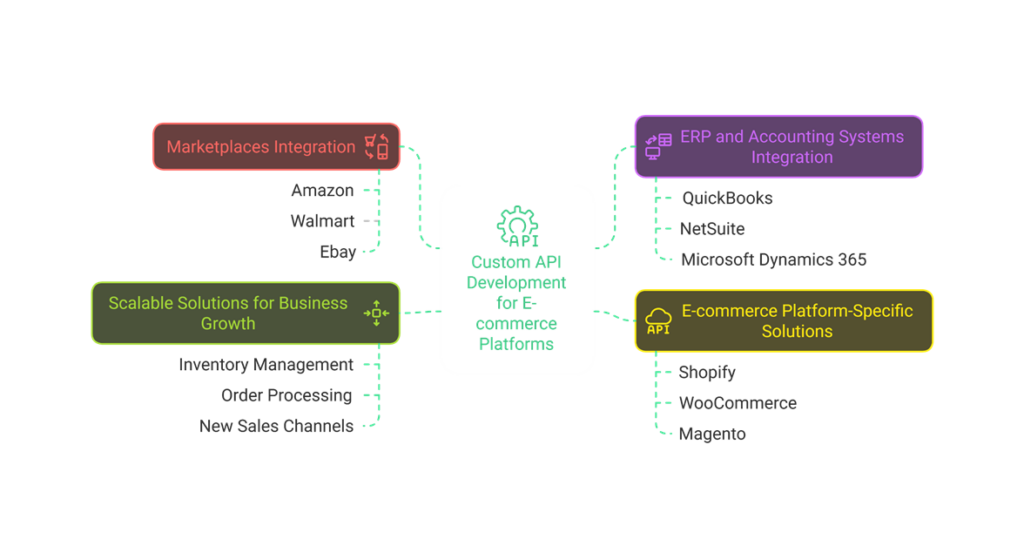
Custom API Development for E-commerce Platforms
When it comes to e-commerce, customization is key. Businesses today require tailor-made API solutions that seamlessly integrate their platform with a variety of third-party services, marketplaces, and enterprise systems. Custom API development for e-commerce platforms enables businesses to enhance their functionality, improve operational efficiency, and provide customers with a smooth, seamless shopping experience.
At Koigel, we specialize in building custom APIs for e-commerce platforms that cater to the unique needs of your business. Whether you operate on Shopify, WooCommerce, Magento, or are looking to integrate with major marketplaces such as Amazon, Walmart, and BestBuy, our team has the expertise to deliver scalable and efficient API solutions.
Tailored API Solutions for Leading Marketplaces
If your business operates on popular online marketplaces like Ebay, Walmart, Amazon, or Newegg, seamless integration with these platforms is crucial. Our API solutions for Walmart, Amazon, Newegg, and other major marketplaces enable your store to manage inventory, orders, and product listings more efficiently. With a custom-developed API, you can sync product data across multiple marketplaces in real time, ensuring consistency and accuracy.
We also provide custom API integrations for e-commerce businesses that sell through platforms like Amazon, Ebay, Etsy, GameStop, Kroger, Target+, Walmart, BestBuy, NewEgg and TikTok Shop. Our tailored solutions streamline product management, order processing, and customer engagement, helping you scale effortlessly across different online marketplaces.
ERP and Accounting System Integrations
For larger e-commerce operations, connecting your e-commerce platform with enterprise resource planning (ERP) and accounting systems is essential. Koigel offers custom API development for ERP systems such as QuickBooks, NetSuite, Microsoft Dynamics 365, and SAP. These integrations ensure that your financial and business data flows seamlessly between your e-commerce platform and your accounting or ERP software, automating processes like order tracking, financial reporting, and inventory management.
By integrating APIs with QuickBooks and NetSuite, businesses can eliminate manual data entry, reduce errors, and gain better insights into financial performance. These APIs enhance efficiency by connecting sales, inventory, and customer data directly with your accounting system, ensuring accurate and timely reporting.
E-commerce Platform-Specific API Integrations
Each e-commerce platform has its own set of requirements and integrations. Whether you’re running a store on Shopify, WooCommerce, Magento, or any other platform, we provide custom API solutions that cater specifically to each system.
For Shopify, we offer robust API solutions that enable smooth integration with third-party services like payment gateways, shipping providers, and inventory management systems. Our custom Shopify APIs allow for greater flexibility, providing you with tools to automate various processes such as product listings, order fulfillment, and customer engagement.
If you use WooCommerce for your WordPress-based store, our custom WooCommerce APIs can integrate your store with payment gateways, shipping services, and marketing tools to enhance customer experience and streamline operations. These APIs ensure that your e-commerce site is scalable and capable of handling increasing traffic and transactions.
For businesses using Magento, we provide custom Magento APIs that can connect with third-party tools like payment processors, shipping carriers, and CRM systems, allowing your store to operate at its best.
Scalable API Solutions for Business Growth
At Koigel, our custom API development for e-commerce platforms is designed to grow with your business. We understand the need for scalability, especially as your business expands and your platform needs become more complex. Whether it’s managing inventory, processing orders, or integrating new sales channels, we ensure that the APIs we build are capable of handling high volumes of data and transactions without compromising performance.
Our API solutions are flexible and can be customized for businesses of any size, from small startups on WooCommerce to large enterprises using Magento or integrating with D&H and Synexx for wholesale distribution.
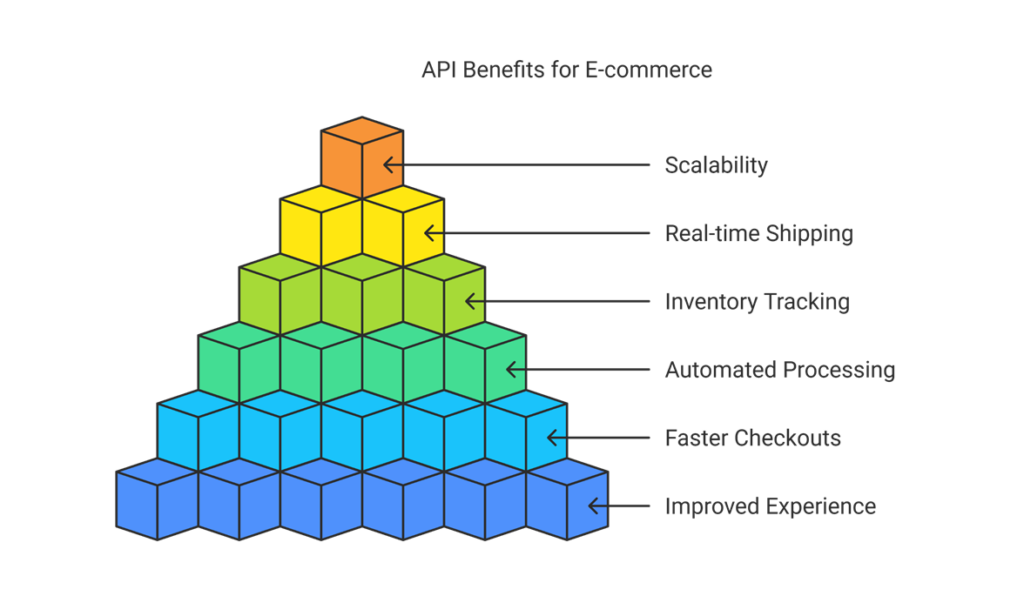
Benefits of APIs for E-commerce Businesses
In the fast-paced world of e-commerce, businesses need to streamline operations and provide an exceptional customer experience to stay competitive. API development for e-commerce has revolutionized how online stores operate, offering solutions that improve functionality, automation, and customer satisfaction. In this section, we will explore the key benefits of APIs for e-commerce businesses, from enhanced customer experience to more efficient order processing.
Improved Customer Experience with APIs
In the competitive e-commerce landscape, providing a seamless and personalized shopping experience is crucial for customer retention. APIs play a vital role in achieving this by enabling real-time data exchange and integration with various third-party services. By integrating API solutions into your online store, you can offer personalized product recommendations, provide dynamic pricing, and tailor promotions based on user behavior.
One of the key benefits of APIs for improving customer experience is the ability to enhance faster checkouts. With integrated payment gateway APIs, customers can pay via their preferred methods, making the checkout process quick and easy. This reduces cart abandonment rates and increases conversion, offering a smoother shopping experience.
Automated Order Processing with APIs
Order processing is a time-consuming task that can impact efficiency if not automated. APIs enable automated order processing, reducing the need for manual intervention and minimizing human error. When integrated with inventory management and shipping APIs, an order can automatically be routed through various stages—from order confirmation to stock update to shipment preparation—without requiring manual updates at each stage.
With automated order processing, your team can focus on more strategic tasks, such as marketing and customer service, while the backend operations run efficiently and accurately. This leads to faster order fulfillment, improving customer satisfaction and operational efficiency.
Faster Checkouts with API Integrations
The checkout process is one of the most critical steps in an e-commerce transaction. Customers expect a smooth and fast checkout experience, and delays can result in abandoned carts and lost sales. By integrating payment gateway APIs, such as PayPal or Stripe, into your e-commerce platform, you can offer customers a range of payment options, streamline the transaction process, and reduce friction.
Moreover, API-driven faster checkouts also allow for features like saved payment details and express checkout, further accelerating the process and providing convenience to repeat customers. This not only improves user experience but also drives higher conversion rates and increased sales.
Better Inventory Tracking with APIs
Inventory management is an essential part of running a successful online business. Without an efficient inventory tracking system, businesses can face issues such as overselling, stockouts, and delayed shipments. APIs provide the ability to track inventory in real-time and sync data across various platforms, ensuring that product availability is always accurate.
Through inventory management APIs, you can track product levels, automatically update stock quantities, and receive alerts when stock is low. This provides an accurate overview of your inventory, enabling you to replenish stock on time and avoid disappointing customers due to unavailable items.
Real-time Shipping Rates with APIs
Shipping costs are a key factor for online shoppers when deciding whether to complete a purchase. APIs that integrate with shipping carriers like FedEx, UPS, and DHL enable e-commerce businesses to display real-time shipping rates based on the customer’s location and the weight of their order. This functionality allows customers to choose the most cost-effective or expedited shipping option, improving the shopping experience.
With real-time shipping rates powered by shipping APIs, your customers will know exactly how much they need to pay for shipping before completing their purchase. This transparency helps reduce cart abandonment due to unexpected shipping costs and increases overall satisfaction with the purchasing process.
Enhanced Scalability and Flexibility with API Integrations
As your e-commerce business grows, so do your integration needs. APIs provide a flexible solution that allows you to scale your online store and integrate with new platforms, services, and marketplaces. Whether you need to add a new payment processor, integrate a new shipping partner, or sync your store with an enterprise resource planning (ERP) system, APIs make it easier to add new functionality to your store without disrupting existing operations.
By utilizing API integrations, you can easily adapt to changes in your business environment, expand to new markets, and support increased traffic as your business grows. This scalability ensures that your e-commerce platform remains responsive to customer demands while maintaining high performance.
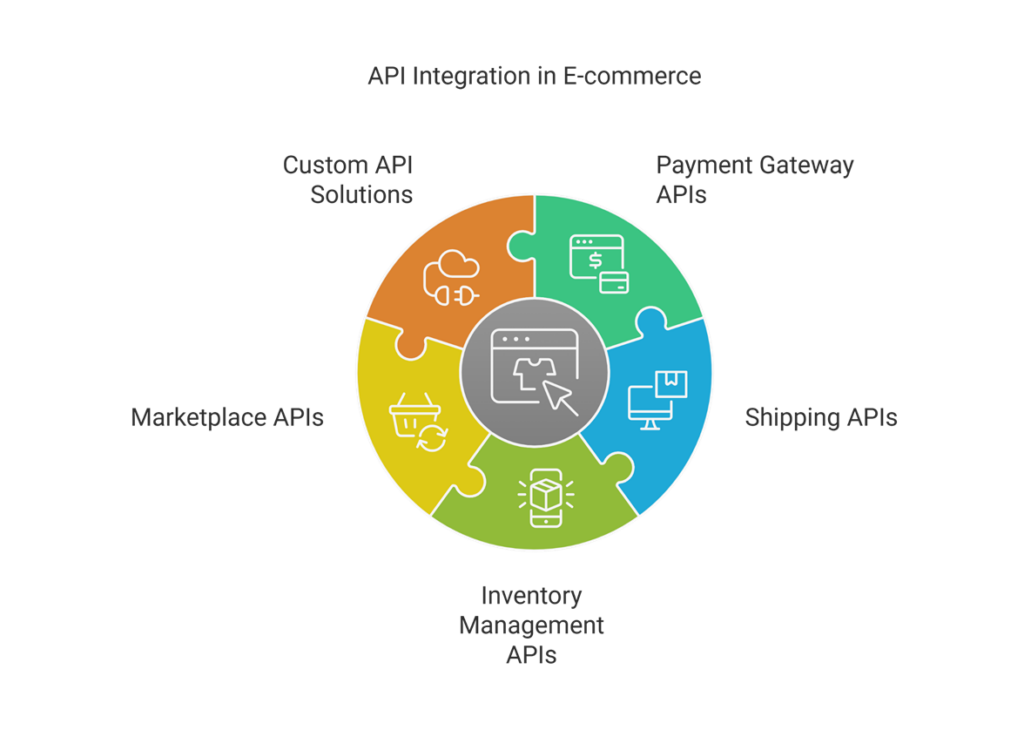
Integrating APIs with E-commerce Platforms
Integrating APIs with e-commerce platforms is essential for creating an optimized, efficient, and flexible online store. APIs, or Application Programming Interfaces, enable smooth data flow between systems, making it easier to synchronize various aspects of an e-commerce operation. By connecting e-commerce platforms with third-party services, businesses can automate tasks, enhance features, and offer customers a seamless shopping experience.
E-commerce platforms such as Shopify, WooCommerce, and Magento offer a variety of API integration solutions to connect with payment gateways, shipping providers, and inventory management systems. Additionally, integration with large marketplaces such as Amazon, Walmart, and BestBuy enables businesses to manage their product listings, orders, and customer interactions across multiple channels.
Key integrations for e-commerce businesses include:
1. Payment Gateway APIs: For seamless transactions, integrating APIs for PayPal, Stripe, and other payment solutions is critical. These APIs allow for secure and smooth payment processing across different platforms.
2. Shipping APIs: APIs for carriers like FedEx, UPS, and DHL can automatically calculate real-time shipping rates, update tracking information, and provide customers with the latest delivery estimates.
3. Inventory Management APIs: Integration with systems like NetSuite, QuickBooks, and other ERP tools can automate inventory updates and manage stock levels efficiently. This integration helps avoid overselling and ensures that customers are presented with accurate product availability.
4. Marketplace APIs: By integrating with platforms like Amazon, Walmart, NewEgg, and Target+, e-commerce businesses can synchronize their product listings, orders, and customer data across multiple channels. This allows for central management, improving efficiency and reducing the chances of errors.
5. Custom API Solutions: For businesses with unique needs, custom Magento APIs and other bespoke solutions can be developed to connect specific third-party systems or services that may not have pre-built integrations available. These customized APIs provide tailored solutions for specific business requirements.
Incorporating these API integrations within an e-commerce platform not only simplifies backend operations but also provides better visibility, accuracy, and control over various business processes. As a result, businesses can scale more effectively while delivering a more personalized and efficient shopping experience to customers.
Ensuring API Security for E-commerce Transactions
When integrating APIs into e-commerce platforms, ensuring the security of transactions is paramount. APIs are essential for automating processes, connecting to payment gateways, managing customer data, and handling various backend operations. However, with the increasing amount of sensitive data being transmitted, it is crucial to implement security measures that protect both businesses and their customers from potential threats.
Secure Payment API Development
One of the most critical aspects of API security in e-commerce is developing secure payment APIs. Secure payment API development ensures that payment details, including credit card information and bank account data, are encrypted and transmitted safely. Integrating with trusted payment gateways like PayPal, Stripe, and Square provides built-in encryption protocols to safeguard sensitive customer data.
To enhance security, businesses should ensure that the payment API follows industry standards such as the Payment Card Industry Data Security Standard (PCI DSS), which sets requirements for secure handling, processing, and storage of cardholder information. Additionally, tokenization can be used, which replaces sensitive payment data with unique tokens, reducing the risk of exposure.
Fraud Prevention with APIs
Fraud prevention is another key component of API security. APIs can be used to integrate various fraud detection services and tools that help identify suspicious activity during online transactions. For example, APIs can be integrated with 3D Secure, address verification systems (AVS), and machine learning algorithms to detect fraudulent transactions before they are completed.
By analyzing transaction patterns in real-time, these systems can flag potential fraud and stop malicious activities. Additionally, APIs for two-factor authentication (2FA) and multi-factor authentication (MFA) can be implemented to verify user identities and prevent unauthorized access to customer accounts.E-commerce businesses can also implement real-time risk scoring APIs, which assign a risk value to transactions based on various factors such as the IP address, location, and transaction history of the user. This allows businesses to assess the likelihood of fraud and take appropriate actions, such as blocking the transaction or requiring further verification.
Data Encryption and Secure Communication
Ensuring that data transmitted through APIs is encrypted is vital in protecting e-commerce transactions. Using SSL/TLS encryption for all API communications ensures that the data exchanged between the e-commerce platform and external services (such as payment gateways or third-party providers) is secure. Additionally, using OAuth 2.0 for authentication and authorization adds an additional layer of security by limiting the access of third-party services to only the necessary data.
Ensuring the security of API integrations for e-commerce transactions is critical for protecting both businesses and customers from fraud and data breaches. By implementing secure payment API development practices, integrating fraud prevention systems, and using encryption protocols, businesses can build trust with their customers and create a safer online shopping environment.
The API Development Process for E-commerce Businesses at Koigel
At Koigel, we follow a structured and methodical approach to API development for e-commerce businesses, ensuring seamless integrations, security, and scalability. The API development process involves multiple stages, from initial planning to post-launch maintenance, with an emphasis on delivering high-quality, customized solutions that cater to the specific needs of online stores. Below is an overview of the key steps we take to ensure a successful API development process.
1. Planning
The first step in the API development process is comprehensive planning. This phase involves understanding the specific requirements of the e-commerce business and the goals the API needs to achieve. Whether it’s integrating a payment gateway, inventory management system, or shipping solution, our team at Koigel collaborates with the business to define the key functionalities and performance expectations.
In this phase, we also analyze the e-commerce platform the business is using, such as Shopify, Magento, or WooCommerce, and identify the best API integration strategy. The planning stage also includes defining the API’s security measures, data flow protocols, and ensuring compliance with industry standards.
2. Exploration
Once the planning phase is complete, we enter the exploration stage. This is where we investigate available API solutions, third-party services, and libraries that will facilitate the integration. During this phase, we explore different technologies and tools, ensuring that the chosen solutions align with the business’s goals and technical environment.
In some cases, Koigel develops custom APIs for online stores to meet specific needs that out-of-the-box solutions can’t address. Whether it’s integrating with Amazon, eBay, or building a custom API for inventory management or payment processing, we ensure that the solution will be scalable, flexible, and robust enough to support future business growth.
3. Designing APIs for Online Stores
The design phase is where we bring the exploration findings to life by creating an API architecture that supports the specific functionalities required by the e-commerce platform. Designing APIs for online stores involves deciding the structure, endpoints, data formats, and response codes to ensure smooth and efficient communication between systems.
Our design process includes a focus on ease of use for developers, flexibility for future expansions, and performance optimization. We carefully design each API endpoint to ensure fast response times and minimal latency, which is critical for maintaining a seamless customer experience on e-commerce websites.
4. Development
In the development phase, we begin building the API based on the design specifications. At Koigel, we follow best practices for coding, documentation, and version control to ensure the API is easy to maintain and scale in the future. This phase also includes integrating the API with the e-commerce platform and third-party services.
During development, we ensure that the API can handle high traffic and process data efficiently, as performance is crucial for e-commerce transactions. Whether it’s handling payments securely, managing inventory levels in real-time, or integrating with shipping APIs like FedEx or UPS, we ensure the API meets the e-commerce platform’s needs.
5. API Testing for E-commerce
After development, API testing is essential to ensure that everything works as expected. Our testing process includes functional testing, performance testing, and security testing to identify any potential issues or vulnerabilities.
We perform stress tests to simulate high-traffic scenarios, ensuring that the API can handle peak loads without causing downtime or slow response times. Security testing is also a priority, ensuring that the API is resistant to common vulnerabilities like SQL injections and cross-site scripting (XSS). Additionally, we test the API’s integration with various third-party services to confirm that it can seamlessly exchange data and perform required actions, such as processing payments or updating inventory.
6. Delivery and Integration
Once the API passes testing, we move on to the delivery phase. In this stage, the API is deployed to the production environment, and we perform final integration with the e-commerce platform and other services. At Koigel, we ensure that the transition from development to live deployment is smooth and does not disrupt any ongoing business operations.
We also assist with any data migration or synchronization that may be required during the integration process, ensuring all systems work together seamlessly to deliver an optimized experience.
7. Post-launch Monitoring and Maintenance
The API development process doesn’t end with delivery. We provide ongoing monitoring and maintenance services to ensure the API continues to function effectively. This includes addressing any bugs or performance issues, as well as implementing updates as the e-commerce platform or third-party services evolve.Regular updates to the API are necessary to ensure compatibility with new platform versions, third-party tools, and changing business needs. Koigel offers continuous support to maintain the security, reliability, and efficiency of the API over time.
E-commerce Success Stories with API Development
In today’s rapidly evolving digital landscape, e-commerce businesses are increasingly leveraging API development to streamline operations, enhance customer experience, and boost revenue. The right API integrations can significantly improve everything from inventory management to payment processing, helping online stores grow, scale, and stay competitive. Let’s look at a few real-world success stories where API development played a pivotal role in transforming e-commerce businesses.
Case Study 1: Streamlining Inventory Management for a Global Fashion Retailer
A well-known global fashion retailer was facing challenges with managing its large and diverse inventory across multiple e-commerce platforms. With thousands of new products being added daily and inventory changes occurring in real-time, manual updates were leading to errors, out-of-stock issues, and unsatisfied customers. The company needed an API solution that could seamlessly synchronize inventory data across its online stores, warehouses, and distribution centers.
The Solution: The fashion retailer turned to custom API development to address their inventory management issues. By integrating an inventory management API, they were able to link their e-commerce platform with their central inventory system. This allowed for real-time updates on stock levels, automatic restocking, and accurate inventory forecasts.
The Results:
- Streamlined inventory: The API integration ensured that inventory levels were updated in real time across all platforms.
- Fewer stockouts: Automatic updates helped prevent overselling and ensured customers could only order products that were in stock.
- Increased sales: With a smoother inventory management process, the retailer was able to meet customer demand faster, leading to an increase in sales and customer satisfaction.
This success story is a prime example of how API integration can boost operational efficiency and ultimately lead to increased sales by improving stock management and reducing human error.
Case Study 2: Boosting Sales with Payment Gateway API Integration
A mid-sized online electronics store was looking for ways to reduce friction in its checkout process and improve conversion rates. They were dealing with abandoned carts and frustrated customers who were unable to complete purchases due to slow or unreliable payment systems. The company needed a reliable payment gateway API to simplify the payment process and support multiple payment methods.
The Solution: By integrating PayPal and Stripe payment gateway APIs, the store streamlined the entire checkout process. Customers could now choose from a variety of payment methods, including credit/debit cards, PayPal, and even cryptocurrency. The API ensured that transactions were processed securely and quickly, providing real-time payment confirmations and preventing fraud.
The Results:
- Faster checkouts: The streamlined payment process led to a quicker, smoother checkout experience, reducing cart abandonment rates.
- Higher conversion rates: With more payment options available, the business saw an increase in completed transactions.
- Improved customer trust: Secure and reliable payment processing built customer trust, resulting in more repeat business and positive reviews.
By using payment gateway API integration, this electronics store was able to simplify their payment processing, leading to a significant improvement in sales and customer satisfaction.
Case Study 3: Boosting Customer Engagement with CRM API Integration
An e-commerce business in the beauty and skincare industry faced difficulties in engaging customers effectively. They were unable to personalize marketing efforts and manage customer relationships efficiently across different channels. The company needed a comprehensive solution that could centralize customer data and enable personalized communication.
The Solution: The beauty retailer implemented a CRM API that integrated customer data from multiple touchpoints, including their website, social media, and customer support systems. This API allowed them to capture real-time data about customer preferences, purchase history, and browsing behavior.
The Results:
- Personalized marketing: With real-time access to customer data, the business was able to send personalized recommendations and targeted offers based on customers’ interests and previous purchases.
- Improved customer retention: By offering tailored promotions and discounts, customer engagement increased, leading to improved retention rates.
- Better customer service: The CRM API integrated with customer support channels, allowing for quicker response times and improved customer satisfaction.
Thanks to the CRM API integration, the beauty retailer was able to provide a more personalized shopping experience, which not only increased customer loyalty but also boosted sales.
Case Study 4: Optimizing Logistics with Shipping APIs
An online furniture store was struggling with long delivery times and high shipping costs. They were using multiple logistics providers, but there was no unified system to manage shipping rates, tracking, and delivery times. This was resulting in delays, unexpected costs, and dissatisfied customers.
The Solution: The furniture retailer turned to shipping and logistics APIs like FedEx and UPS to automate and optimize their shipping process. These APIs allowed them to offer real-time shipping rate comparisons, track shipments, and update customers with accurate delivery estimates.
The Results:
- Faster shipping: Real-time updates and integrated logistics allowed for faster and more accurate delivery, which reduced shipping delays.
- Lower shipping costs: The ability to compare rates from multiple providers helped the business choose the most cost-effective shipping options.
- Improved customer satisfaction: Customers were happier with the faster, more reliable delivery, which led to fewer complaints and higher ratings.
By leveraging shipping API solutions, the furniture retailer was able to improve its logistics process, reduce shipping costs, and enhance the overall customer experience, leading to an increase in repeat orders.
These e-commerce success stories clearly demonstrate the powerful impact that API development can have on online businesses. Whether it’s improving inventory management, simplifying payment processing, enhancing customer relationships, or optimizing shipping, APIs enable e-commerce businesses to automate critical processes and provide better customer experiences. By embracing custom API solutions tailored to their specific needs, companies can streamline their operations, increase sales, and stay competitive in today’s digital marketplace.At Koigel, we understand the importance of API development for e-commerce businesses and work closely with our clients to deliver the best API solutions. From inventory management APIs to payment gateway integrations and CRM solutions, we ensure that your e-commerce platform is well-equipped to thrive in the ever-changing online landscape.
How APIs Drive E-commerce Automation
In the fast-paced world of e-commerce, automation has become a cornerstone for improving operational efficiency, reducing costs, and providing customers with a seamless shopping experience. At the heart of this automation is the use of Application Programming Interfaces (APIs), which enable systems to communicate with each other and automate complex workflows. APIs help e-commerce businesses streamline operations, enhance customer interactions, and ultimately, drive growth. Let’s dive deeper into how APIs are revolutionizing e-commerce automation.
1. Automating Inventory Management with APIs
Inventory management is one of the most crucial aspects of e-commerce. Manually tracking and updating inventory can lead to errors, missed sales, and customer dissatisfaction. APIs provide a solution by automating inventory updates, ensuring that stock levels are always accurate across various platforms.
How It Works: By integrating inventory management APIs, businesses can sync stock data in real time between their website, warehouse management system, and third-party marketplaces (like Amazon, eBay, or Walmart). For example, an inventory management API linked to Shopify or WooCommerce can automatically adjust the stock levels whenever a sale occurs. This eliminates the need for manual updates and ensures the information is always up-to-date.
Impact on Automation: With automated inventory management, e-commerce businesses can:
- Avoid overselling or understocking products.
- Ensure real-time stock level updates across all sales channels.
- Reduce human error and free up time for more strategic tasks.
This is just one example of how APIs simplify inventory management, leading to more efficient and automated business operations.
2. Streamlining Order Processing and Fulfillment
Order processing is another critical area where APIs can streamline operations. Once an order is placed, multiple systems must work together to process, pack, and ship the product to the customer. APIs facilitate this by automating the entire order fulfillment cycle.
How It Works: APIs can integrate order management systems with shipping providers, payment gateways, and warehouse management tools. For example, a payment gateway API (like Stripe or PayPal) can automatically authorize payments when an order is placed, and a shipping API (such as FedEx or UPS) can instantly calculate shipping rates and print shipping labels. This reduces the need for manual data entry and speeds up order processing.
Impact on Automation: E-commerce businesses benefit from:
- Faster order processing, reducing delays and improving customer satisfaction.
- Seamless integration between payment, fulfillment, and shipping systems.
- Automated tracking updates that inform customers about their orders in real time.
This streamlined order processing and fulfillment process is essential for meeting customer expectations and maintaining operational efficiency.
3. Automating Customer Service with APIs
Providing excellent customer service is a top priority for any e-commerce business. APIs can significantly enhance customer support by automating common inquiries and integrating various communication channels like live chat, email, and phone support.
How It Works: CRM (Customer Relationship Management) APIs integrate customer data from various sources, allowing businesses to personalize interactions and respond more efficiently. Chatbot APIs, for example, can answer common customer queries 24/7, while email marketing APIs can send personalized offers based on previous purchases.
Impact on Automation: With the help of APIs, businesses can:
- Automate responses to frequently asked questions, saving time for customer support teams.
- Offer personalized customer support by accessing detailed customer profiles through CRM APIs.
- Enhance customer experience by providing faster and more efficient service.
By automating customer support, businesses can provide a more responsive service, ensuring that customers feel heard and valued without requiring extensive human intervention.
4. Real-time Shipping and Delivery Automation
Shipping and delivery are critical components of the e-commerce experience. Customers expect quick, reliable shipping options, and businesses need to manage logistics efficiently to maintain profitability. APIs help automate these processes by providing real-time shipping quotes, tracking updates, and delivery scheduling.
How It Works: Integrating shipping APIs with e-commerce platforms allows businesses to instantly compare shipping rates from multiple carriers (such as UPS, FedEx, and DHL), calculate the fastest delivery options, and automatically update customers on their order status. Furthermore, tracking APIs can send real-time updates to customers, keeping them informed about their package’s whereabouts.
Impact on Automation:
- Customers receive accurate shipping estimates and tracking information without manual intervention.
- Businesses can optimize shipping costs by choosing the most cost-effective delivery options.
- Automated tracking updates reduce customer inquiries and improve satisfaction.
Automating the shipping and delivery process not only saves time but also enhances the customer experience by providing timely and accurate information.
5. Personalizing Marketing and Sales with APIs
Personalization is key to driving engagement and sales in the e-commerce space. APIs enable businesses to automate the delivery of personalized content and offers to customers based on their browsing behavior, purchase history, and preferences.
How It Works: By integrating CRM APIs with marketing automation platforms, businesses can create personalized email campaigns, recommend products based on browsing behavior, and send targeted discounts to loyal customers. Customer segmentation APIs allow businesses to divide customers into different groups for more targeted marketing efforts.
Impact on Automation:
- Personalized marketing messages reach the right audience with minimal manual effort.
- Businesses can create dynamic product recommendations based on customer data.
- Increased customer loyalty and conversion rates through tailored offers and discounts.
APIs enable e-commerce businesses to deliver highly relevant marketing messages, ultimately driving higher sales and improving customer retention.
6. Enhancing Data Analytics and Reporting with APIs
Data-driven decision-making is vital for the success of any e-commerce business. APIs enable businesses to automate the process of data collection, analysis, and reporting, providing valuable insights in real time.
How It Works: By integrating analytics APIs with e-commerce platforms, businesses can collect data from various sources, such as customer interactions, sales performance, and website traffic. These APIs can feed data into analytics tools (like Google Analytics or Tableau), providing businesses with detailed reports on performance metrics such as conversion rates, customer behavior, and inventory turnover.
Impact on Automation:
- Businesses can access real-time insights to make informed decisions quickly.
- Automated reporting frees up time and resources for more strategic tasks.
- Enhanced decision-making based on comprehensive data analysis.
Automating data collection and reporting allows businesses to focus on growth strategies, armed with actionable insights that drive success.
Empowering E-commerce Growth with API Automation
API-driven automation is transforming how e-commerce businesses operate, allowing them to scale efficiently, improve customer experience, and boost profitability. From automating inventory and order processing to enhancing customer service and marketing, APIs provide the backbone for seamless, integrated systems that drive success in today’s competitive digital landscape. By leveraging e-commerce automation with APIs, businesses can streamline their operations, reduce human error, and offer faster, more personalized services to customers.
Incorporating API solutions into your e-commerce platform is a surefire way to stay ahead of the curve and ensure your business thrives in the fast-evolving e-commerce space.
Real-World Applications of E-commerce APIs
In the ever-evolving world of e-commerce, businesses are constantly looking for ways to improve the customer experience, streamline operations, and stay competitive. One of the most effective ways to achieve these goals is through the use of APIs (Application Programming Interfaces). APIs allow businesses to connect different systems and automate various processes, making e-commerce platforms more efficient and user-friendly.
Let’s explore some of the real-world applications of e-commerce APIs that are helping businesses enhance their operations and deliver exceptional customer experiences.
1. Product Search APIs
Product search functionality is one of the most essential features on an e-commerce website. Customers expect to find products quickly and easily, and search performance can directly impact the user experience and sales conversion rates. Product Search APIs enable businesses to offer robust, advanced search capabilities that go beyond simple keyword matching.
How It Works: Product search APIs integrate with e-commerce platforms to provide enhanced search features such as autocomplete, filters, product recommendations, and relevance-based sorting. These APIs can use machine learning and natural language processing (NLP) to understand customer intent and improve search results over time.
For example, when a customer types in a product name or category, the product search API can instantly display relevant results, prioritize products based on customer preferences or previous searches, and even suggest complementary items. This functionality can be integrated with popular e-commerce platforms like Shopify, WooCommerce, and Magento.
Real-World Impact:
- Improved User Experience: Customers can easily find the products they are looking for, leading to increased satisfaction and reduced bounce rates.
- Increased Conversions: By offering personalized search results and recommendations, e-commerce stores can increase the likelihood of a purchase.
- Faster Search Speed: With APIs, product search results are delivered in real-time, ensuring customers get instant access to product listings.
2. Order Tracking APIs
Order tracking is a key element in ensuring a smooth post-purchase experience for customers. When customers place an order, they expect to be able to track its progress and know when it will arrive. Order tracking APIs help businesses automate and streamline this process, offering real-time tracking updates and improving customer satisfaction.
How It Works: Order tracking APIs connect e-commerce platforms with shipping carriers such as UPS, FedEx, DHL, and USPS. These APIs enable businesses to retrieve tracking information and share it with customers through various channels like email, SMS, or the website itself. Customers can check the status of their orders, view shipping updates, and track their delivery in real time.
For example, when a customer places an order on an online store, an order tracking API can automatically send a confirmation email with tracking details. As the shipment progresses, the API updates the status and provides estimated delivery times.
Real-World Impact:
- Enhanced Customer Transparency: Customers can track their orders at any time, improving transparency and reducing anxiety about deliveries.
- Reduced Customer Support Requests: With real-time tracking, customers are less likely to contact support teams for order status updates.
- Streamlined Operations: Businesses can automate tracking notifications, saving time and effort in manually updating customers on their order status.
3. Customer Support Chatbot APIs
Customer support is a crucial aspect of any e-commerce business. Providing fast and accurate responses to customer inquiries can significantly impact satisfaction and retention. Customer support chatbot APIs allow businesses to automate customer service by using intelligent bots that can handle a variety of customer queries.
How It Works: Chatbot APIs integrate with e-commerce platforms and customer service systems to provide real-time support through messaging platforms like live chat, social media, or even mobile apps. These chatbots can answer common questions related to product details, order status, shipping information, and return policies. By using NLP and machine learning, chatbots can learn from interactions and improve their responses over time.
For example, when a customer asks about the availability of a product, the chatbot API can instantly provide the answer, or if the customer wants to track their order, the chatbot can pull real-time tracking data from an order tracking API. These bots can even escalate issues to human agents when necessary, ensuring seamless service.
Real-World Impact:
- 24/7 Availability: Chatbots provide around-the-clock support, ensuring customers can get assistance at any time.
- Instant Responses: Customers receive quick answers to their questions, reducing wait times and improving satisfaction.
- Cost Savings: By automating responses to common queries, businesses can reduce the need for large customer support teams, saving on operational costs.
4. Payment Gateway APIs
Payment processing is a critical component of any e-commerce platform. Customers expect to pay for their purchases quickly, securely, and with a variety of payment options. Payment gateway APIs facilitate secure, seamless, and efficient payment processing for e-commerce businesses.
How It Works: Payment gateway APIs integrate with e-commerce websites to allow for secure transactions via credit cards, digital wallets, bank transfers, and even cryptocurrency. These APIs connect to payment processors like PayPal, Stripe, Square, and others, ensuring that transactions are secure and processed in real time.
For example, when a customer checks out, the payment gateway API securely captures payment details, processes the payment, and confirms the transaction. The API also handles fraud prevention and security measures, ensuring that sensitive customer data is encrypted and protected.
Real-World Impact:
- Enhanced Security: Payment gateway APIs provide secure payment processing, reducing the risk of fraud and data breaches.
- Multiple Payment Options: Businesses can offer a variety of payment methods to cater to different customer preferences, including credit cards, digital wallets (like Apple Pay or Google Pay), and more.
- Faster Transactions: With real-time payment processing, customers can complete transactions quickly, improving the overall shopping experience.
5. Shipping and Logistics APIs
Efficient and accurate shipping is critical to the success of an e-commerce business. Shipping and logistics APIs help businesses automate shipping calculations, streamline delivery processes, and improve shipping accuracy.
How It Works: Shipping APIs integrate with shipping carriers (such as FedEx, UPS, and DHL) to provide businesses with real-time shipping rates, delivery options, and estimated delivery times. These APIs can also automatically generate shipping labels, track deliveries, and manage returns.
For example, when a customer checks out, the shipping API can automatically calculate the best shipping rates based on the customer’s location, package size, and delivery speed. The API can then provide the customer with various shipping options and update them with tracking details.
Real-World Impact:
- Accurate Shipping Rates: Businesses can provide customers with precise shipping costs, avoiding unexpected charges at checkout.
- Faster Delivery Times: Shipping APIs can help optimize delivery routes and choose the fastest delivery methods.
- Seamless Shipping Management: Shipping APIs automate label generation, tracking, and returns, reducing manual effort and streamlining operations.
6. Inventory Management APIs
Managing inventory across multiple sales channels and warehouses is often a complex task for e-commerce businesses. Inventory management APIs automate inventory tracking, ensuring that stock levels are always up to date.
How It Works: Inventory management APIs integrate with e-commerce platforms and inventory management systems to synchronize stock data across various channels, including online stores, physical stores, and marketplaces like Amazon and eBay. When a product is sold, the API updates inventory levels in real time, preventing overselling or stockouts.
For example, when an item is sold on an e-commerce platform, the inventory management API automatically deducts the sold item from the stock count and updates inventory levels on other connected platforms.
Real-World Impact:
- Real-Time Inventory Syncing: APIs ensure that inventory data is up-to-date across all channels, avoiding issues like overselling or stockouts.
- Increased Efficiency: Automating inventory tracking reduces the need for manual stock checks, freeing up time for other tasks.
- Better Supply Chain Management: Businesses can maintain better control over stock levels and order fulfillment processes.
Transforming E-commerce Operations with APIs
APIs are essential for streamlining various operations in the e-commerce space, from product search and order tracking to customer support and payment processing. By leveraging these APIs, businesses can automate key tasks, improve efficiency, and offer better experiences to their customers. Real-world applications such as product search APIs, order tracking APIs, chatbot APIs, and payment gateway APIs show just how powerful APIs can be in enhancing e-commerce operations. With the help of APIs, e-commerce businesses can remain competitive, improve customer satisfaction, and grow more efficiently in today’s digital-first world.
Challenges in E-commerce API Development and How We Overcome Them
Developing APIs for e-commerce platforms comes with its own set of challenges. These challenges can impact the performance, scalability, and security of the platform. Below are some common obstacles faced in e-commerce API development and how they are overcome:
1. Scalability Issues
As your business grows, so does the volume of data and transactions that APIs need to handle. APIs must be scalable to support increased traffic, especially during peak shopping seasons.
How We Overcome It: We ensure that our APIs are built on robust architectures that can scale seamlessly. Using cloud-based infrastructure and microservices, we can distribute loads efficiently and handle high volumes of transactions without compromising performance.
2. Security Concerns
With sensitive customer data being transferred through APIs, security is paramount. Payment information, shipping details, and personal data must be protected from potential threats.
How We Overcome It: We implement strict security protocols like SSL/TLS encryption, token-based authentication, and continuous vulnerability assessments to ensure that data remains secure at all times.
3. Integration Complexity
Integrating APIs with multiple third-party platforms (like payment gateways, CRMs, and shipping providers) can be complex and time-consuming, especially when dealing with varying standards.
How We Overcome It: We use standardized communication protocols like REST and GraphQL, along with detailed API documentation and pre-built connectors, to simplify integration and ensure smooth communication between systems.
4. Real-Time Data Synchronization
E-commerce platforms require real-time data synchronization, particularly for inventory management and order tracking, to ensure customers receive up-to-date information.
How We Overcome It: We employ advanced caching techniques and event-driven architectures to ensure that API responses are quick and data stays synchronized across all systems in real time.
API Maintenance and Support for E-commerce Businesses
APIs are integral to the smooth functioning of e-commerce platforms, and maintaining them is crucial for ensuring that online stores remain efficient, secure, and up-to-date. Regular maintenance and timely support services are essential to avoid downtime, minimize disruptions, and enhance the overall user experience.
1. Importance of Continuous API Updates
As technology and business needs evolve, it’s critical to update APIs regularly to accommodate new features, security enhancements, and platform improvements. This includes fixing bugs, upgrading to the latest versions of third-party services, and adding new functionalities to meet emerging business needs.
How We Ensure Continuous API Updates: At Koigel, we offer continuous monitoring and updating services to ensure that all APIs are running smoothly. We keep up with the latest trends and update the APIs as necessary to guarantee that they work efficiently with your evolving e-commerce platform.
2. API Support Services for Online Stores
E-commerce platforms often face unexpected challenges, from integration issues to security concerns. Quick and reliable support services are vital to resolve issues promptly and prevent service disruptions.
How We Provide API Support: Our API support services include round-the-clock monitoring, troubleshooting, and customer assistance to handle any issues that may arise. Whether it’s an integration problem, security vulnerability, or performance issue, our support team is always ready to assist in maintaining the optimal functionality of your APIs.
3. Ensuring Seamless User Experience
To keep users satisfied, it’s essential that e-commerce platforms offer a seamless experience. This requires the smooth operation of APIs that handle various processes such as payment, inventory management, shipping, and customer data.
How We Ensure Seamless User Experience: Through regular maintenance checks and updates, we ensure that all APIs work in harmony to provide a fast and frictionless experience for both customers and store owners. Our proactive approach minimizes downtime and reduces disruptions, ensuring smooth interactions for every user.
4. Scaling APIs as Your Business Grows
As your e-commerce store expands, the volume of data and transactions increases. APIs need to scale to handle the growing traffic and data demands.
How We Handle Scaling: We design and maintain APIs that are scalable from the beginning. As your business grows, we adjust and enhance the API’s performance to meet higher demands, ensuring that your platform remains reliable even as traffic surges.
Tools and Technologies We Use for E-commerce API Development
In our e-commerce API development process, we leverage a variety of advanced tools and technologies to ensure scalable, secure, and high-performance integrations. These tools help streamline the development, testing, deployment, and management of APIs that power e-commerce platforms. Here’s an overview of the key tools and technologies we use:
1. API Design and Documentation
- Swagger/OpenAPI: We utilize Swagger (OpenAPI) to design and document our APIs, ensuring they are easy to understand and maintain. This tool allows us to auto-generate client libraries and API documentation for seamless integration.
- Postman: Postman is our go-to tool for testing and iterating on APIs. It provides a user-friendly interface to send API requests, inspect responses, and automate tests.
- RAML: For designing and documenting RESTful APIs, we use RAML (RESTful API Modeling Language) to create human-readable API specifications that ensure consistency across all endpoints.
2. API Development Frameworks
- Node.js with Express: We rely on Node.js for building scalable APIs, using the Express framework for simplicity and speed in building RESTful services.
- Django with Django REST Framework: For Python-based e-commerce applications, we use Django in conjunction with Django REST Framework to easily develop robust APIs.
- Spring Boot (Java): For high-performance Java-based API development, we use Spring Boot, which allows us to quickly build production-ready APIs with security and scalability in mind.
3. API Testing Tools
- Postman: In addition to design, Postman is essential for automated API testing, ensuring our APIs perform as expected under various conditions.
- Jest: For APIs developed with JavaScript or Node.js, we use Jest to run automated unit tests and integration tests, ensuring the reliability of each endpoint.
- Insomnia: An alternative to Postman, Insomnia is another tool we use for debugging and testing APIs, offering a simple interface and advanced features.
4. API Management
- Apigee: We use Apigee as our API management platform to monitor, secure, and scale APIs. It provides advanced analytics, rate-limiting, and security features to ensure our APIs remain reliable and efficient.
- AWS API Gateway: For cloud-based API management, we turn to AWS API Gateway, which offers robust security, caching, and integration with other AWS services.
5. Security and Authentication
- OAuth 2.0: For secure and token-based authentication, we implement OAuth 2.0, ensuring that users and third-party applications can securely access APIs.
- JWT (JSON Web Tokens): We use JWT for transmitting claims between parties securely. JWT ensures the safe and efficient exchange of authentication and authorization data.
- SSL/TLS: All our APIs are secured with SSL/TLS encryption, ensuring that data transmitted between servers and clients is encrypted and protected from unauthorized access.
6. Continuous Integration and Deployment (CI/CD)
- Jenkins: We use Jenkins to automate the build, testing, and deployment of our APIs, ensuring that every change is integrated smoothly and continuously tested.
- GitLab CI/CD: GitLab’s CI/CD pipelines allow us to automate the deployment process, reducing errors and improving the efficiency of our development workflow.
7. Monitoring and Analytics
- New Relic: We rely on New Relic to monitor the performance of our APIs in real-time, enabling us to identify and address any issues before they impact end-users.
- Datadog: Datadog helps us track the health and performance of our APIs, providing insights into usage patterns, errors, and potential bottlenecks.
8. Database and Caching Solutions
- MongoDB: As a NoSQL database, MongoDB is used to store and manage unstructured data that is frequently accessed by our APIs.
- MySQL/PostgreSQL: For relational data storage, we use MySQL or PostgreSQL, ensuring fast, reliable access to structured data for e-commerce transactions.
- Redis: We utilize Redis for caching API responses, reducing latency and improving performance for frequently accessed data.
9. Containerization and Virtualization
- Docker: We containerize our API development environments using Docker, ensuring consistency across development, testing, and production stages.
- Kubernetes: Kubernetes helps us manage and orchestrate containers at scale, ensuring that our APIs remain highly available and resilient in production.
10. Versioning and Management Tools
- Git: We use Git for version control to track changes in API codebases, ensuring smooth collaboration and history tracking of all modifications.
- API Versioning: We follow best practices for API versioning using URL paths or headers, allowing us to manage changes while maintaining backward compatibility.
By leveraging these tools and technologies, we ensure that our e-commerce APIs are built for performance, security, and scalability, offering a seamless experience for businesses and customers alike.
Final Thoughts: Why Choose Koigel for Your E-commerce API Development Needs
At Koigel, we understand the importance of seamless, secure, and efficient API integration for your e-commerce business. In today’s fast-paced digital world, having robust, well-maintained APIs is essential to providing your customers with the best shopping experience while keeping your operations running smoothly.
Our expertise in custom e-commerce API development and API integration for online stores enables us to deliver tailored solutions that cater to your unique business needs. Whether you’re looking to streamline operations, enhance security, or scale your platform to accommodate growth, Koigel has the knowledge and experience to support you every step of the way.
By choosing Koigel, you’re not just getting a service provider—you’re gaining a dedicated partner committed to your success. We focus on delivering quality, reliability, and ongoing support to ensure that your APIs perform at their best, driving sales and improving customer satisfaction.
Let us help you take your e-commerce business to new heights with our advanced API development solutions. Contact us today, and let’s discuss how we can transform your online store with seamless API integrations tailored to your needs.
Frequently Asked Questions About E-commerce API Development
1. What is an API and why is it important for my e-commerce business?
An API (Application Programming Interface) is a set of protocols that allows different software applications to communicate with each other. For e-commerce, APIs enable seamless integration between your store, payment gateways, inventory systems, shipping services, and customer relationship management (CRM) tools. This results in smoother operations, faster transactions, and an enhanced customer experience.
2. How can APIs help improve the customer experience on my e-commerce site?
APIs streamline various processes such as product search, checkout, and payment processing. This leads to faster load times, real-time updates on inventory, accurate order tracking, and secure payments—all of which enhance the overall shopping experience for your customers.
3. What types of APIs do I need for my e-commerce business?
Common APIs for e-commerce businesses include payment gateway APIs (e.g., PayPal, Stripe), shipping and logistics APIs (e.g., UPS, FedEx), inventory management APIs, customer support APIs (e.g., chatbots), and product search APIs. The type of APIs you need depends on your specific business requirements.
4. How can I integrate APIs into my e-commerce platform?
API integration involves connecting your online store with third-party services or internal systems using API connectors or custom-built integrations. This typically requires technical expertise, which can be handled by an experienced API development team like Koigel.
5. Can APIs help automate processes in my e-commerce business?
Yes, APIs are essential for automating many tasks in e-commerce, such as order processing, inventory updates, and customer notifications. By automating these processes, you can reduce manual effort, minimize errors, and speed up operations, leading to improved efficiency.
6. How secure are APIs for handling customer data?
When developed and integrated correctly, APIs are highly secure. At Koigel, we implement robust security protocols, such as SSL/TLS encryption, token-based authentication, and regular security audits, to ensure that customer data and financial transactions are protected from threats.
7. Will APIs help my e-commerce business scale as it grows?
Yes, one of the key advantages of APIs is scalability. As your business grows and your needs evolve, APIs can be scaled to handle increased data and transaction volumes. This flexibility allows you to keep pace with growing demand without compromising on performance.
8. How do I choose the right API development partner for my e-commerce business?
Look for an API development partner with experience in e-commerce, a deep understanding of your business needs, and a proven track record of delivering high-quality, secure, and scalable API solutions. Koigel specializes in API development tailored to online stores, ensuring seamless integrations and long-term success.
9. How long does it take to develop and integrate APIs for my e-commerce platform?
The timeline for API development and integration depends on the complexity of your requirements and the number of third-party services you need to integrate. A basic API integration can take a few weeks, while a more complex, custom API solution may take a few months. Our team works efficiently to deliver high-quality APIs within the agreed-upon timeline.
10. What ongoing support do you offer after API development?
At Koigel, we offer continuous API maintenance and support to ensure that your APIs remain up-to-date, secure, and fully functional. Our team provides troubleshooting, performance monitoring, security updates, and scaling solutions to keep your e-commerce platform running smoothly at all times.


